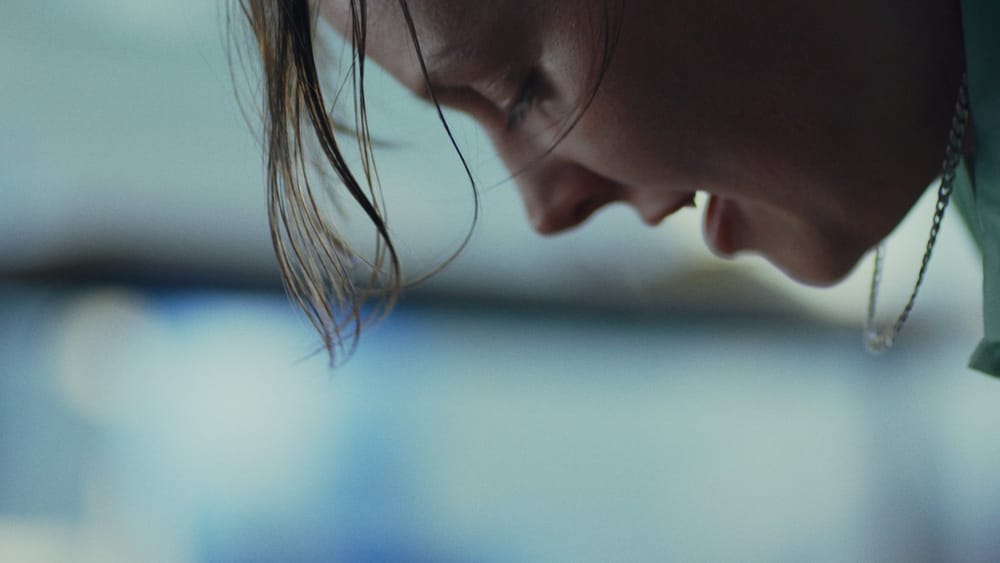So, what of the best Australian films of 2024 then?
The below list talks a look at thirty-one of the best Australian films of 2024. Collectively, those thirty-one films highlight the future state of Australian cinema, spotlighting how creativity persists within funding body supported productions and thrives on the fringes in the area we call ‘independent cinema’.
The year kicked off with Force of Nature: The Dry 2, Robert Connolly and Eric Bana’s follow up to their pandemic-era blockbuster thriller[i], and then meandered along with a handful of titles which screened at your local Hoyts, Event, Palace, and Dendy cinemas. Major productions like Furiosa, Runt, and Memoir of a Snail were welcomed by national audiences, while Hollywood produced Australian shot films like The Fall Guy and Kingdom of the Planet of the Apes haphazardly scratched an action itch.
Lower budget far like Bill Bennett’s The Way, My Way and the Cairnes brothers Late Night with the Devil both found continued audience success thanks to the nifty dual benefit of being good films that were able to drive active word of mouth attendance, as the remaining Australian releases filtered through to the public via limited releases, film festivals, streaming services, and director-driven nationwide screening events.
It's within those marginalised films that we got to see a level of inventiveness playing out in independent cinema; where grand ideas are let loose on budgets that would barely buy the crew of The Fall Guy enough sangas for lunch. Take Danielle Loy’s Alice Springs set musical-drama Under Streetlights, which features songs that rival some of the best Aussie tracks on triple J. In one scene, Leighton Mason’s father reminisces about his time as a dancer who performed near the Eiffel tower, with the scene transitioning seamlessly from the ornate streets of Paris into the dirt red streets of the Alice. It’s a powerfully charged moment that amplifies the emotionally driven film about the importance of expressing one’s self through art.
Community was key in independent cinema as we witnessed teams coming together to transform Esperance into the battlefields of WW1 with Before Dawn, while families supported a sight-impaired surfer on his journey to battle one of the biggest waves in the world in the riveting documentary The Blind Sea. These visually exciting films rivalled many of the major Hollywood productions for scope, scale, and vision.
An engaged film critic should hold their nations film industry to account, and that’s what this list is. The immediate response to a list like this might be ‘I’ve never even heard of most of these titles,’ and fine, if you’re looking for confirmation bias, then you won’t find it here.
But if you’re looking for suggestions on what you should seek out that speaks about Australia and points to the vibrant creativity at work here, then keep reading. The below filmmakers are some of the finest working in the industry right now, with many working in the short film space crafting work that sits comfortably above that of the feature films that are finagled into existence. As a reminder: short films are as valid a filmic format as feature films are.
A note: A few 2024 titles that received wide releases previously appeared on the 2023 list, such as: Birdeater, You Will Never Find Me, and Paco. Additionally, some titles that were viewed in 2024 but will receive a wider release in 2025 include titles like Lesbian Space Princess, Salt Along the Tongue, and Make it Look Real.
In 2024, from shorts to features to documentaries, I viewed 104 Australian films.
These are the thirty-one best Australian films for 2024.
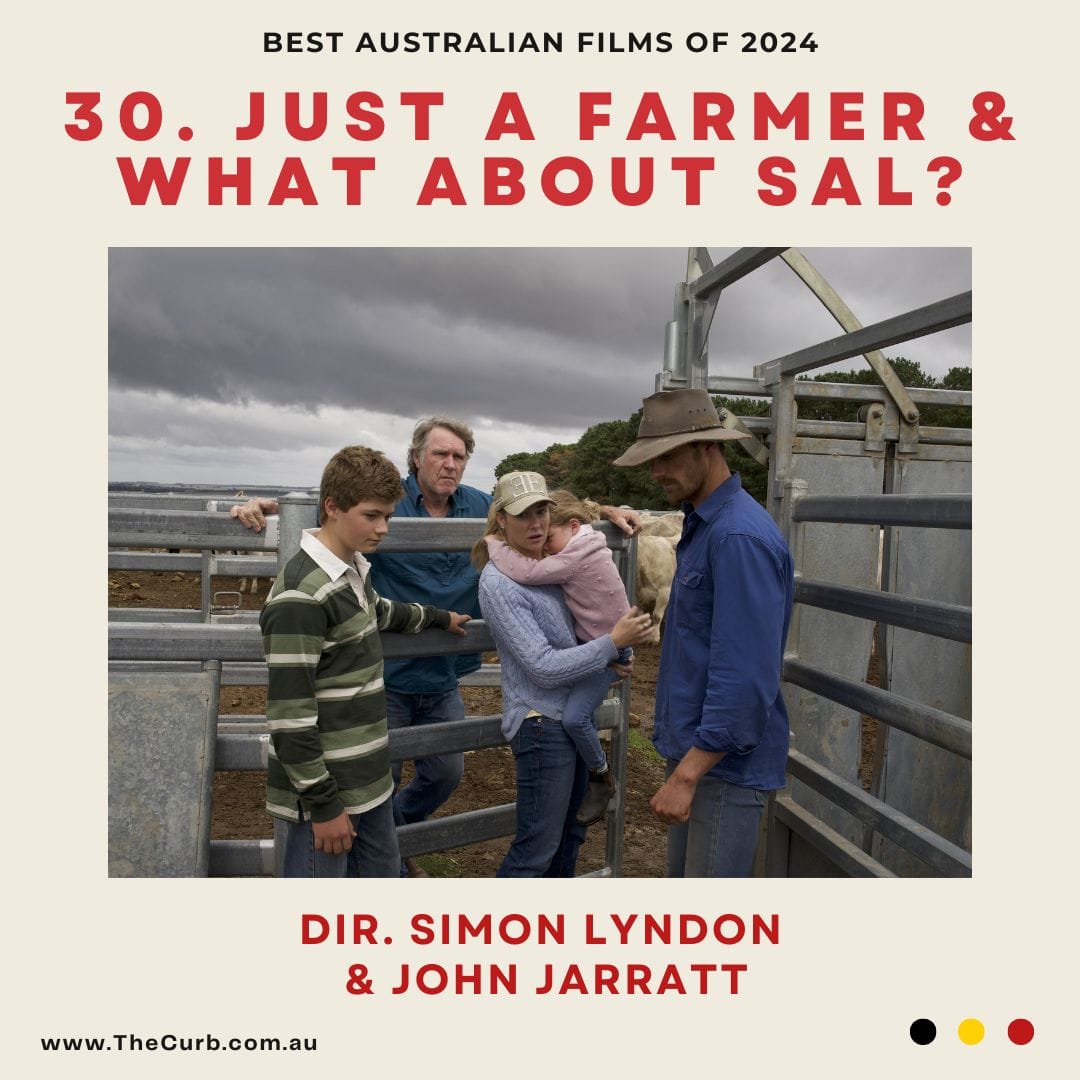
30. Just a Farmer Director: Simon Lyndon; Cast: Leila Mcdougall, Robert Taylor, Joel Jackson, Susan Prior; Producers: Leila Mcdougall, Sean Mcdougall; Writer: Leila Mcdougall What About Sal? Director: John Jarratt; Cast: Gerard O'Dwyer, Kaarin Fairfax, John Jarratt; Producers: John Jarratt, Zadia Jarrett; Writer: John Jarratt
Actors turned directors John Jarratt and Simon Lyndon ask with their powerful films: what is a parent in the space of tragedy? In Jarratt ‘s cheeky drama What About Sal?, masterfully driven by a captivating performance by newcomer Gerard O’Dwyer as Sal, the answer takes the form of boozed up beau Tommy (Jarratt), a washed up rock star who becomes a parent to the son he didn’t know he had when Sal’s mother falls critically ill. In Lyndon’s timely tragedy, Just a Farmer, Susan Prior’s whirlwind aunt Kathryn divines herself into the life of her recently widowed sister Alison (a superb turn from Leila McDougall, the films writer and a farmer herself), with the two becoming parents to Alison’s kids and her father in law. Collectively, these two films talk to the importance of community in times of need, of becoming an unexpected parent, and the weight of supporting those living in difficult circumstances. These are defiantly independent films about real folks living real lives.
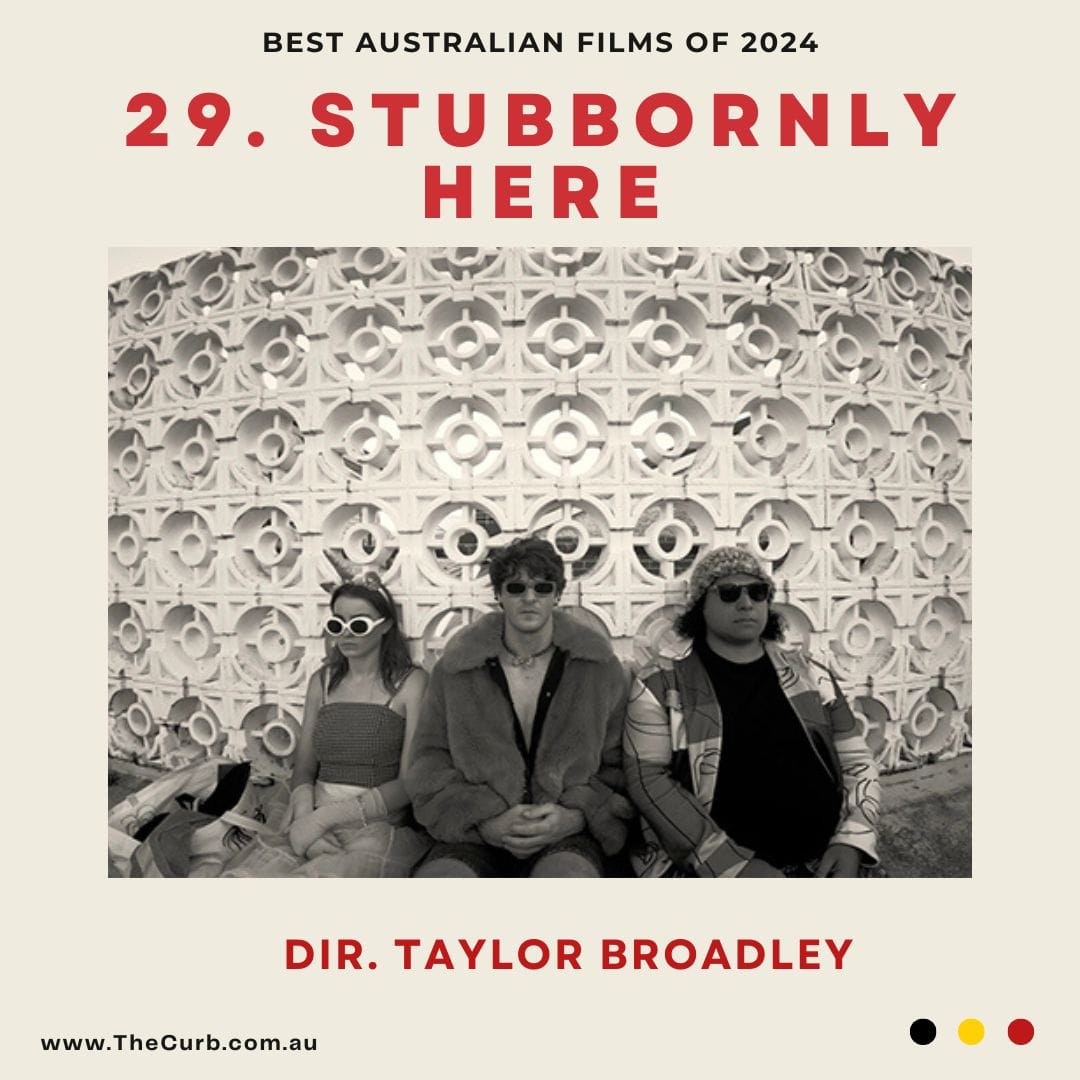
29. Stubbornly Here Director: Taylor Broadley; Cast: Cleo Meinck, Nathan Di Giovanni, Jonathan Maddocks; Producer: Taylor Broadley; Writer: Taylor Broadley
Teens are blinking out of existence. Adults move through life with precious little concern, as if they've accepted the inevitability of a future without youth. Taylor Broadley's Stubbornly Here shows us three teens seeking to use these mysterious disappearances to their advantage by abandoning their home in the unceasing sprawl of personality free Perth to slip away to Sydney to start new lives. Barely out of Dullsville, they encounter an issue and choose to shack up in a motel in the middle of nowhere, stuck in a form of arrested development. Not adults. Not teens. Not going. Not staying. Just existing without a sense of self to hold onto, just the perfume of nostalgia that comes from good memories with each other. You know that one of the three will disappear, you just don't know who, and when it does, you feel the relevance of all of your plans for the future shrink into nothing, like a chip packet in the oven: once full of promise, now, a useless trinket bound to be lost in the midst of life. Broadley's film is a shining example of the West Aussie creative mindset, one that's guided by the notion that this city isn't Sydney. It's not even Adelaide or Hobart. It's Perth. It's Dullsville. And in this sleepy little deathtoll town, a whisper can sound like a shout. That shout is Stubbornly Here, a soft shake of the society sauce bottle, rattling it out of a teenage stupor.
Listen to the interview with Taylor Broadley here.
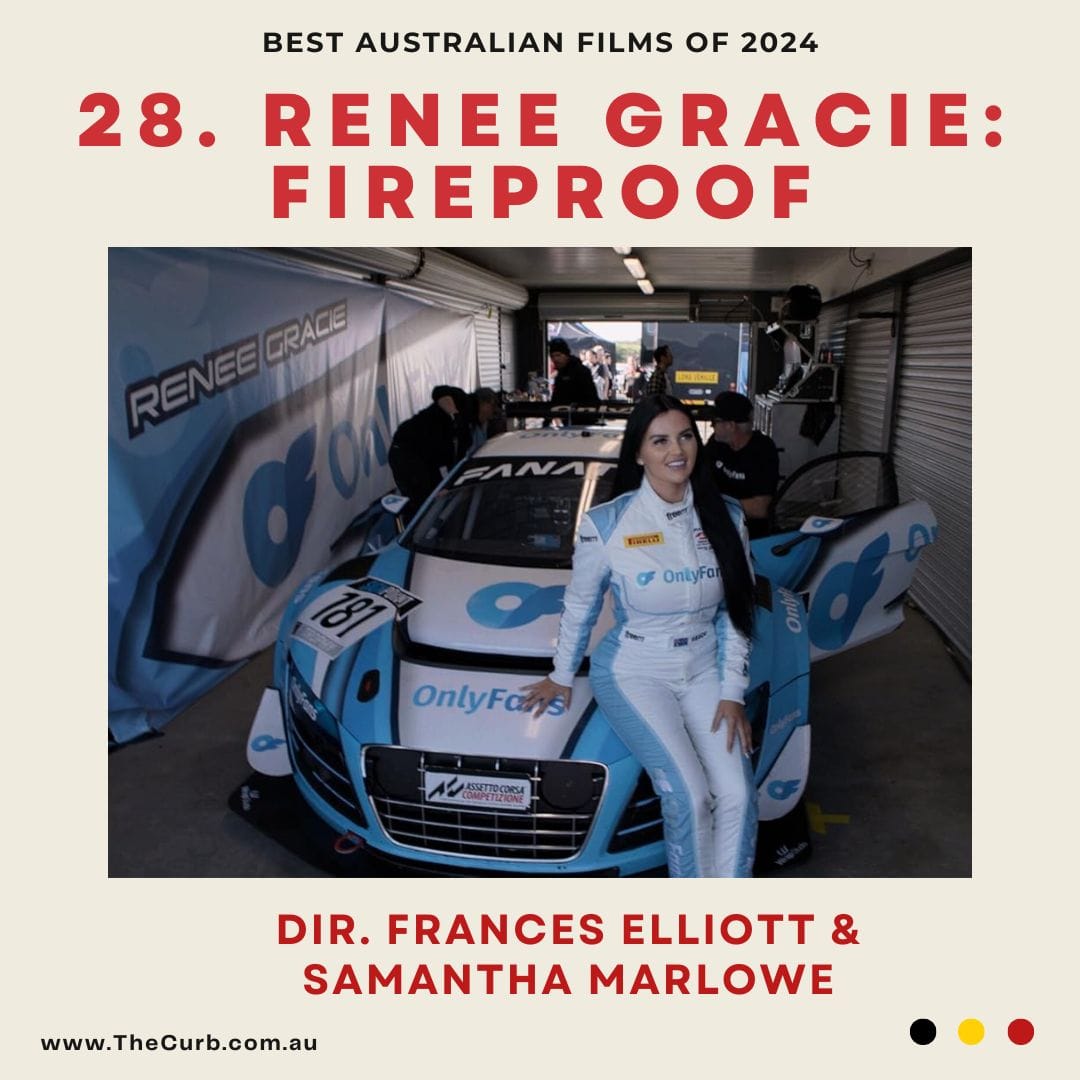
28. Renee Gracie: Fireproof Directors: Frances Elliott & Samantha Marlowe; Featuring: Renee Gracie; Producer: Cody Greenwood; Writers: Frances Elliott, Samantha Marlowe
At the core of Fireproof is a deep, dark examination of the dominance of the patriarchy in Australia, driven by crotch grabbing boofheads high on the fumes of petrol and the giddy high of shouting at the nearest woman. That hyper masculinity is undercut brilliantly by Renee Gracie - a self-confessed revhead who just wants to race in supercars, and maybe one day dominate Bathurst. Instead, she faces a faceless stonewalling organisation so eagerly archaic that you can smell the filthy stench of cigarettes and bush chooks from their budget blokes clubs just from their outward rejection of supplying any footage for this fascinating doc alone. I'm being glib about the sport of race car driving, but that's one thing that Fireproof is not. Instead, Frances Elliott and Samantha Marlowe show utmost respect for the sport, ensuring that the thrill of shooting round a track in a loud car is tangible, and in turn, why Gracie would push so hard to be part of it; hard enough that her self made success on OnlyFans leads to a mighty satisfying retribution and dominance against the same organisation that rejected her to begin with. Satisfying stuff.
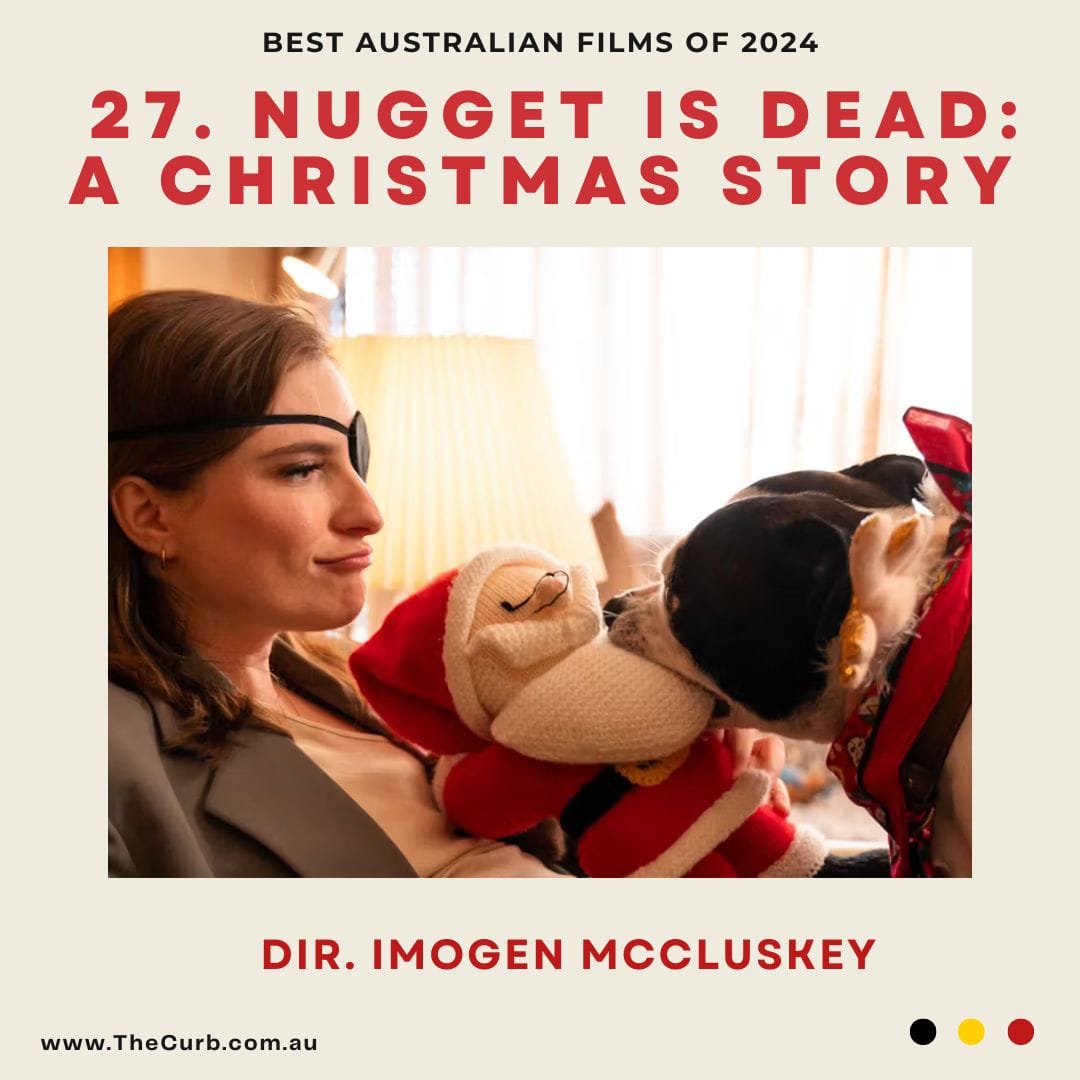
27. Nugget is Dead: A Christmas Story Director: Imogen McCluskey; Cast: Vic Zerbst, Jenna Owen, Damien Garvey, Mandy McElhinney; Producer: Naomi Just; Writers: Vic Zerbst, Jenna Owen
Imogen McCluskey continues her examination of the relationship that Millennials and Gen Z have with the city and the suburbs with Nugget is Dead. The city in question is Sydney, Australia's shiniest and wealthiest metropolis, a magnet for vapid lifestyles that slander suburban living. Steph Stool (co-writer Vic Zerbst) outwardly rejects her suburban roots, shunning any invite to return home for Chrissy. That is, until the only thing that would pull her back home and away from the glitzy life of her Oedipal boyfriend, is in threat: the family dog, Nugget. This charming and cheeky comedy balances the overlapping lives of family in a way that reminds why home is something worthwhile cherishing, all the while never shying away from the cringeworthy nature of the sun-lapping family.
Listen to the interview with Imogen McCluskey here.
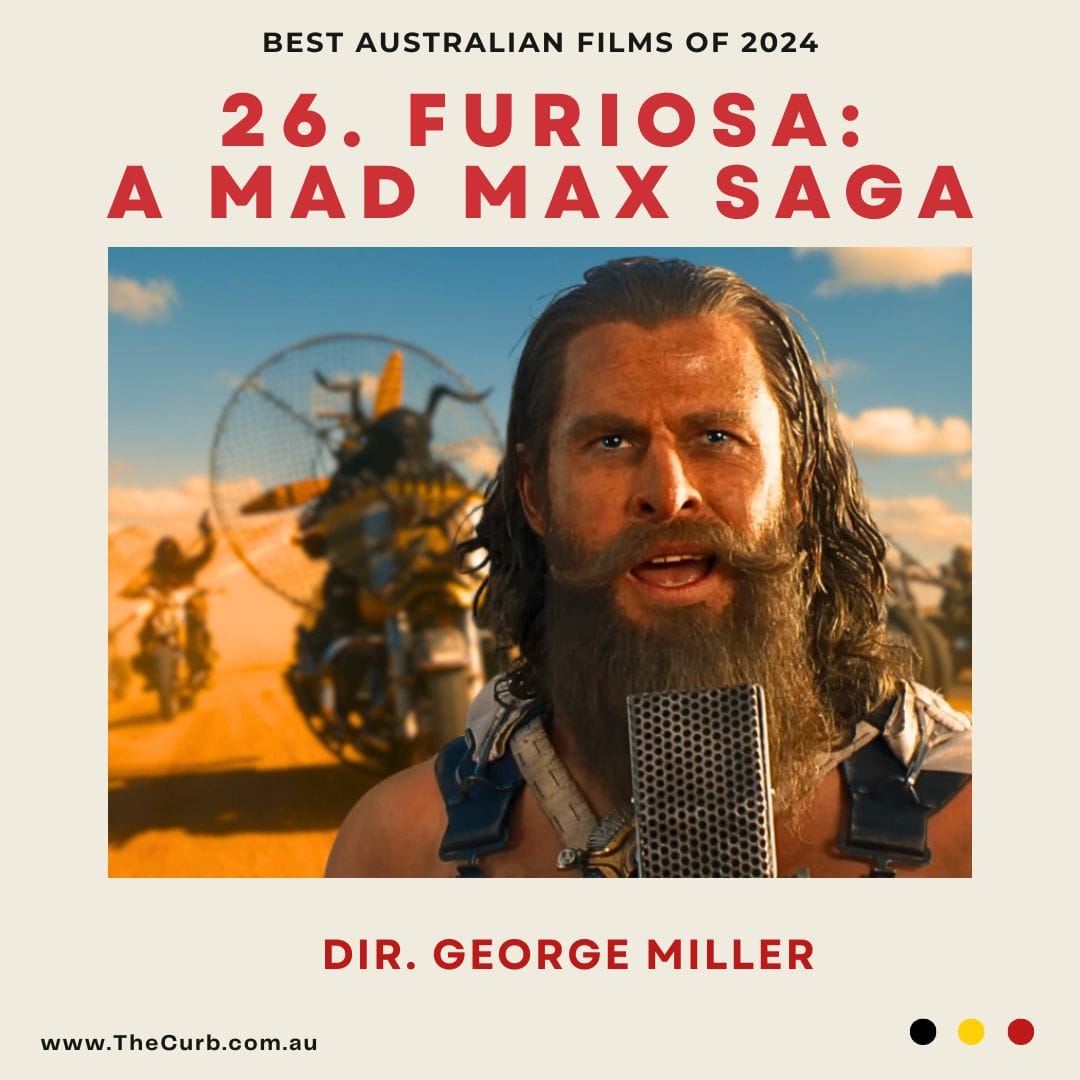
26. Furiosa: A Mad Max Saga Director: George Miller; Cast: Anya Taylor-Joy, Chris Hemsworth, Tom Burke, Alyla Browne; Producer: George Miller, Doug Mitchell; Writers: George Miller, Nick Lathouris
George Miller's magnificent action Furiosa extravaganza does the impossible: gives Chris Hemsworth the chance to sink his teeth into a genuine character that utilises his acting chops to show that he's more than a stock standard action bloke. His nasally Dementus devours the film, failing upwards as he parades through the mayhem with a wicked sense of Australiana. Hemsworth's Dementus spews forth strine-straddled soliloquies like the sunburnt relative of Les Patterson that turn the barren outback into a sandbased stage. Australia rightly becomes Hemsworth's theatre which allows him to present Dementus as his great creation. From teddy bear tchochkes to a grunting bike cobbled together from expired or acquired hogs to his sweat-laden machismo, Dementus is Hemsworth's soaring creation. It's just a shame that the titular character of Furiosa becomes an afterthought in the shadow of his stature. Still, the action is next level great, so that's a plus.
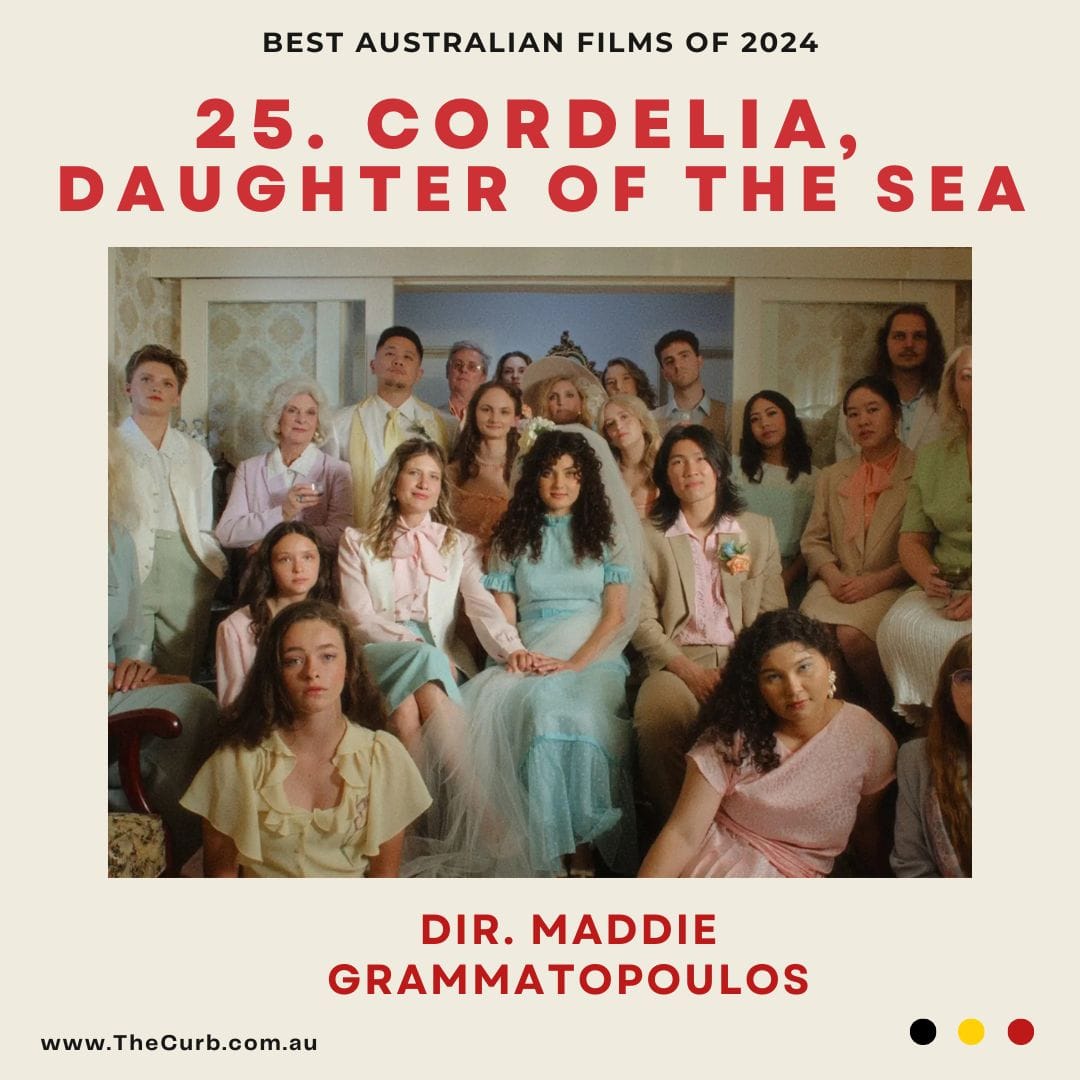
25. Cordelia, Daughter of the Sea Director: Maddie Grammatopoulos; Cast: Luca Asta Sardelis, Renato Musolino, Jack Wong; Producer: Madison Siegertsz; Writer: Maddie Grammatopoulos
Cordelia, Daughter of the Sea is a shining example of why the short film format is a justifiable form of cinematic expression, as you’ll be hard pressed to find anyone who is not an emotional wreck by the close of this gentle drama. Maddie Grammatopoulos’ film sees a father (Luca Sardelis) delivering a monologue to his daughter on the day of her wedding. In the family living room, Cordelia (Luca Asta Sardelis) and her husband (Jack Wong) are swaddled by her extended family while her father talks to her of their past. As father to his child, he talks of her dreams, of what he wants for her life, and what kind of person she might become. These notions are things driven by love, awe and admiration, and hope. The only thing that is certain in life is death, and as Maddie says, all of these feelings are ok.
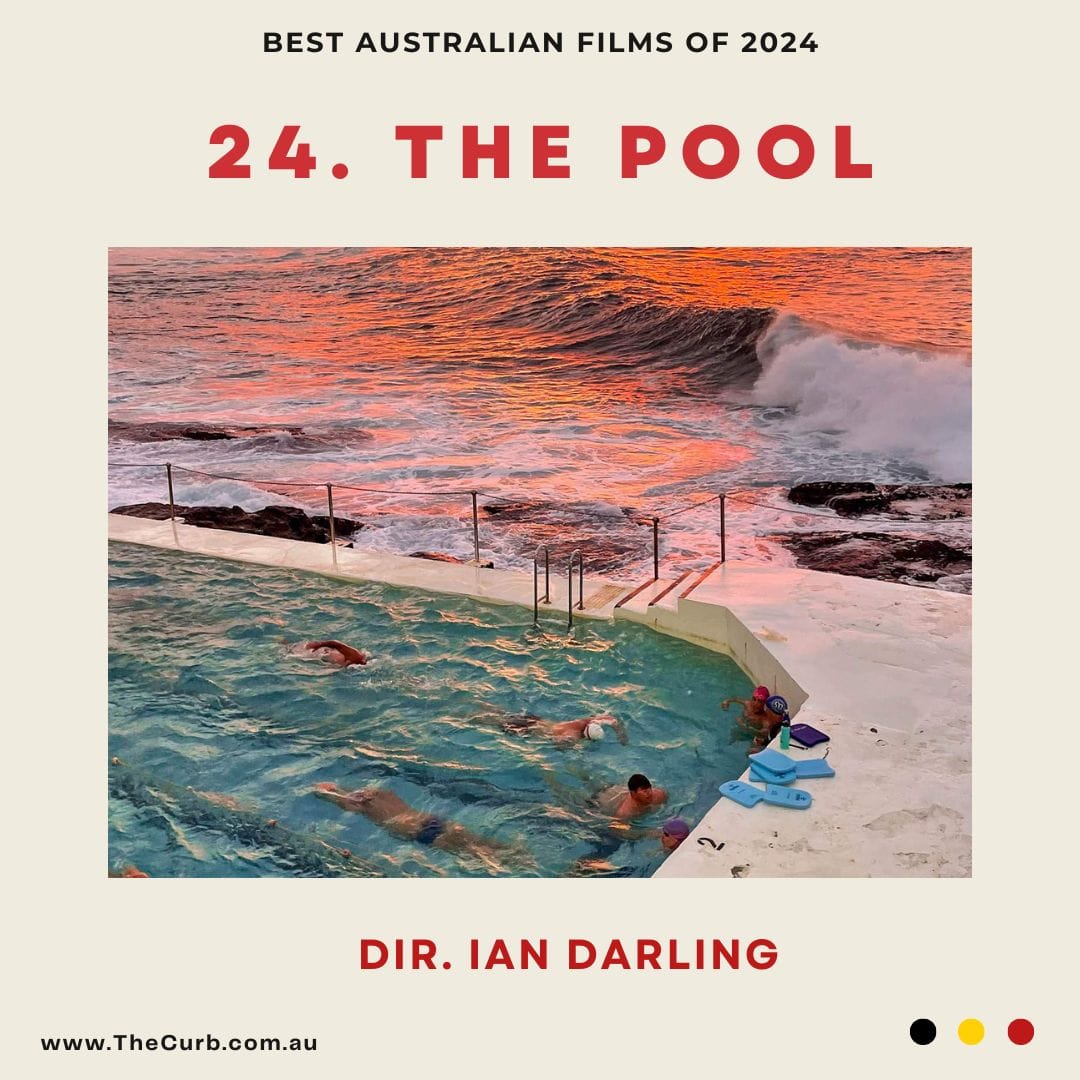
24. The Pool Director: Ian Darling; Featuring: Alex Aroney, Dnita Batcheler, Russell Cheek, Jason Ching; Producer: Ian Darling, Mary Macrae
Ian Darling's The Pool is the closest thing to sleep-friendly cinema that I've experienced out of the Australian film scene in years. Not as a film to fall asleep to, but one to dream of. When I first viewed The Pool, I kept thinking 'how do I slink into this film and just let it wash over me?' I'm yet to find a way into it, even though the logic would be to just travel to the pool that the film is about, the Bondi Icebergs pool in Sydney which sits on the coast. But, I know that if I did that, it wouldn't be the same. What Darling and his team have created is a mood-driven piece that acts as an ode to the relaxed nature of the antipodes. Our cast of tanned bathers-clad figures have seemingly found a fountain of mental calm, with many returning to the pool on a daily basis to relinquish the stress of the day in the wash of the water. It looks great too, with shades of blue, purple, and grey that I never knew existed appearing in the skies. The Pool is a calming slumber brought to life, one that I revisit in my dreams regularly.
Listen to the interview with Ian Darling here.
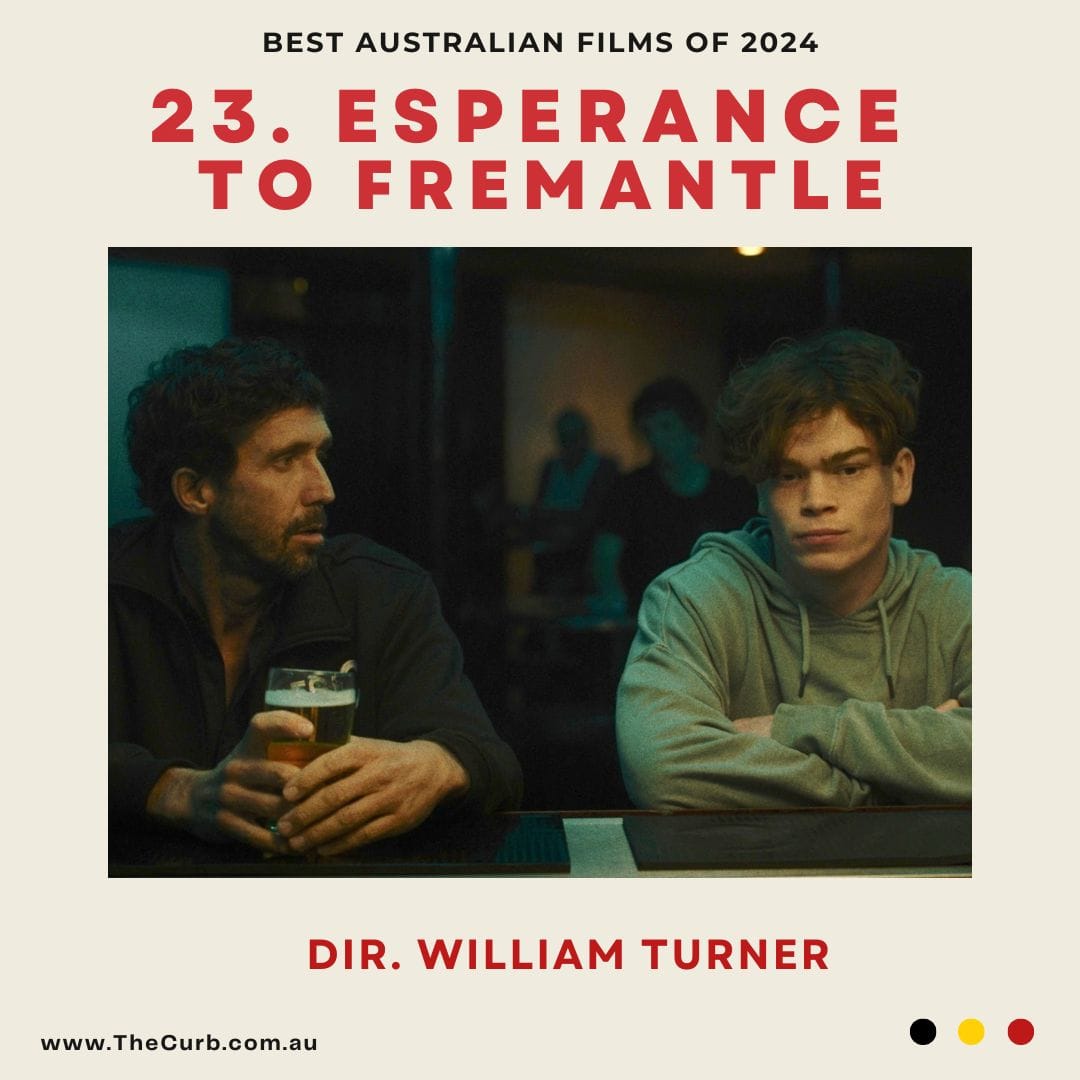
23. Esperance to Fremantle Director: William Turner; Cast: Luke Jai McIntosh, Robert Roy Jackson; Producers: Patrick Nichols, Alexander Turner, Cameron Whiteford; Writer: William Turner
It takes about eight hours to drive from Esperance to Fremantle. A long road through the farmland of the Wheatbelt leaves a solitary driver with plenty of time to consider their past and their future, while the present exists just to get to their final destination. For Luke McIntosh's Rob, arriving at his destination means the chance to track down his father who he hasn't seen since he was an infant. Robert Jackson's Tom isn't aware that Rob is on his way, let alone what he looks like. For all he knows, his son may as well not exist. Rob uses that ignorance to see what his father is like as a man, as a bloke who could possibly turn into a mate; the idea of which he's spent at least eight hours thinking about. William Turner's quiet direction lets this relationship play out in one of the many dingy pubs that exist to service the workers of the wharf and little more than that, and in doing so, he gifts the audience a narrative that resonates long after its short runtime.
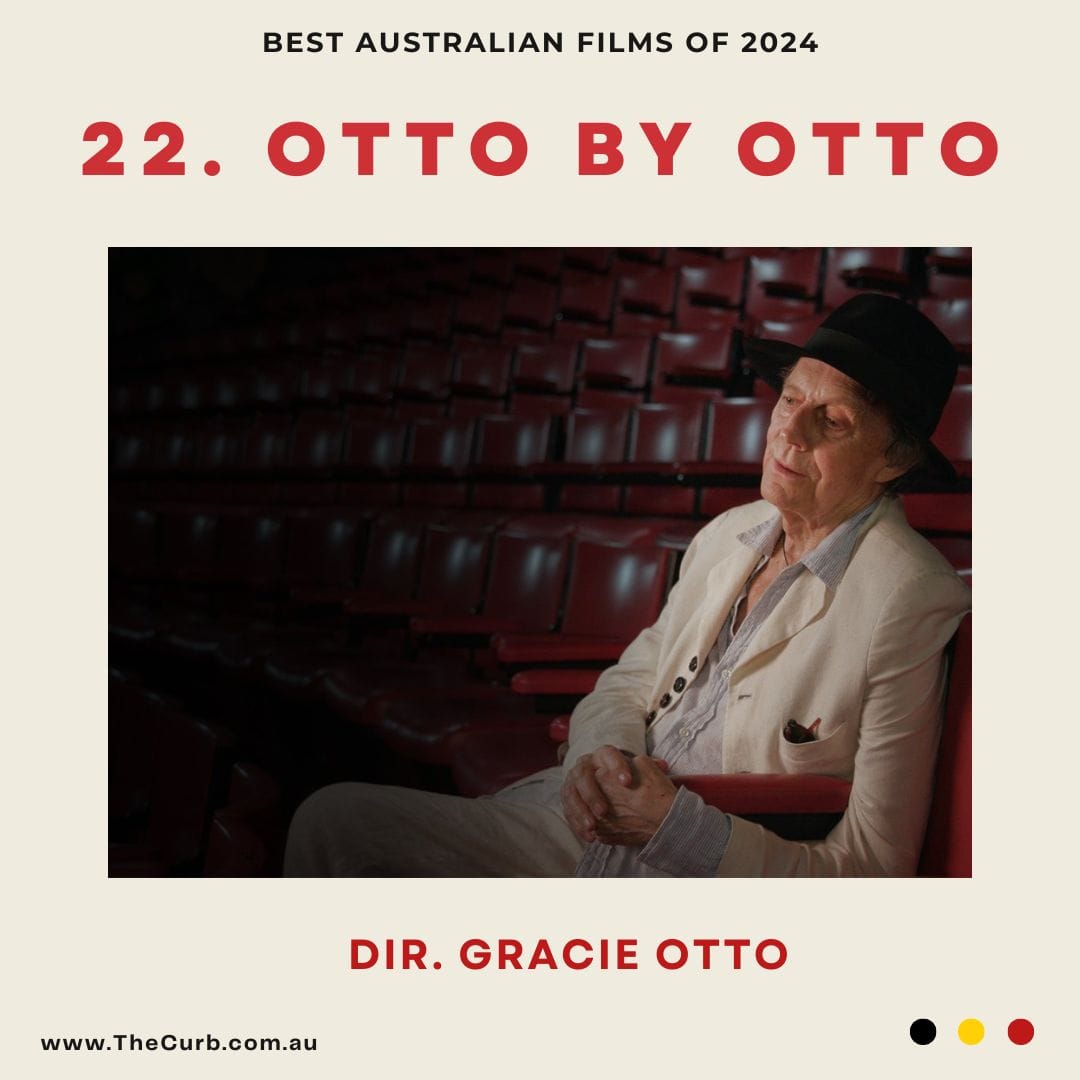
22. Otto by Otto Director: Gracie Otto; Featuring: Barry Otto, Gracie Otto, Ray Lawrence, Baz Luhrmann; Producers: Cody Greenwood, Nicole O’Donohue; Writer: Karen Johnson
The Stan. Revealed series of documentary features has been an odd one. On one hand, there's a Ben Roberts-Smith doc, a poisoned water flick, and then there's Gracie Otto's intimate portrait of her father, the great Barry Otto. Otto by Otto takes us through the history of Barry's work on stage, then on screen in films like Bliss and Strictly Ballroom. Yet, this isn't just a walk down memory lane, as Gracie notes that many of Barry's great performances on stage were ephemeral, fleeting experiences that exist in memories and newspaper snippets. She then treats the doc as a chance to get Barry on stage one last time to present a one person show he did in his youth, aiming to immortalise her father in his sanctuary: the theatre. The undertaking of this play reveals - there's that title again - an underlying concern about Barry's health that amplifies the importance of capturing the present for the future. Intimate and delicate, Otto by Otto presents one of Australia's great screen legends.
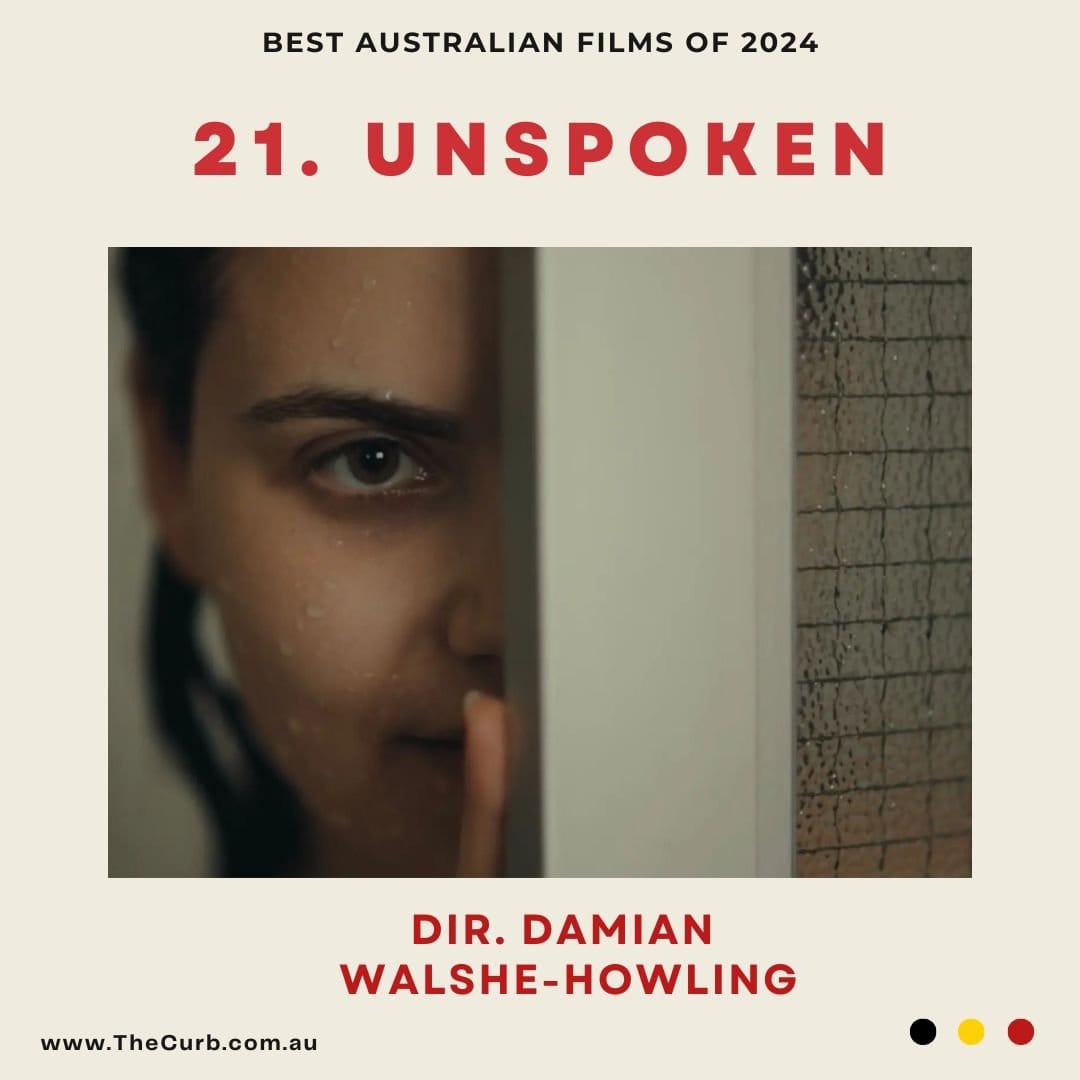
21. Unspoken Director: Damian Walshe-Howling; Cast: Kat Dominis, Mariana Rudan, Damian Walshe-Howling, Matthew Alexander, Steve Mouzakis; Producers: Kat Dominis, Ana Thu Nguyen, Mariana Rudan, Damian Walshe-Howling; Writers: Kat Dominis, Mariana Rudan, Damian Walshe-Howling
Kat Dominis centres Damian Walshe-Howling’s searing dramatic short Unspoken. As Marina, and as the films co-writer, Dominis commands the screen as if it’s where she’s meant to be, creating an urgent energy that adds to the vitality of the narrative of a Croatian family living in Sydney in 1979 as protests for Croatian independence erupt in the streets. Marina is a young woman seeking to live a life for herself with her Anglo boyfriend, adjacent to that of her culturally proud brothers who participate in the protests against their fathers will. Under the direction of Walshe-Howling, the intensity of these conflicting events reaches a furious and bloody confluence point which spills out at home. While Unspoken speaks to a Croatian families existence in Australia, the similarities between other migrant families whose homelands are in turmoil makes this short a timely and impactful experience. I look forward to seeing the careers of Kat Dominis, Damian Walshe-Howling, and fellow co-writer, producer, and actor Mariana Rudan grow from here; there’s an urgency to their stories that Australia, and the world, needs to hear right now.
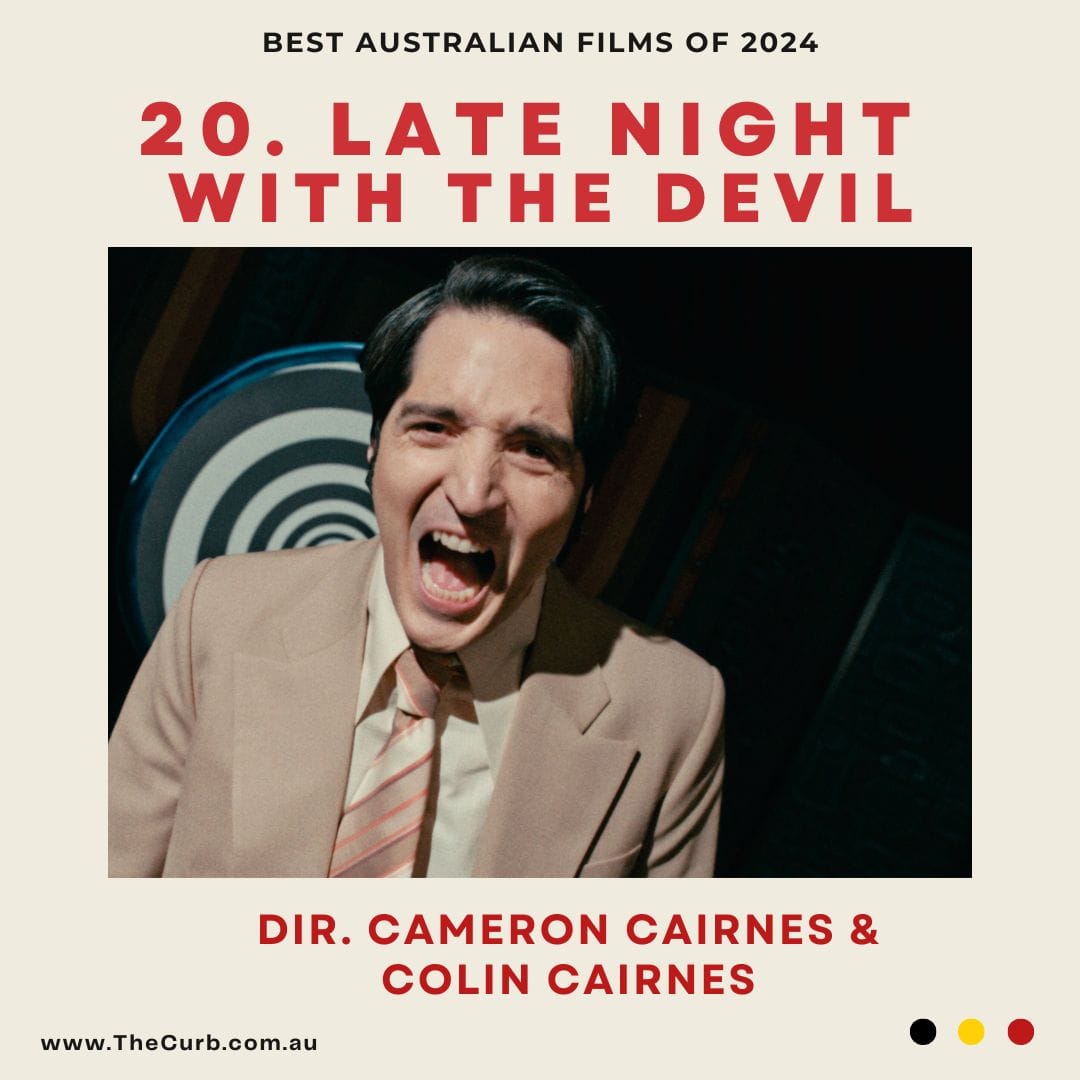
20. Late Night with the Devil Directors: Cameron Cairnes, Colin Cairnes; Cast: David Dastmalchian, Laura Gordon, Fayssal Bazzi, Ingrid Torelli; Producers: Derek Dauchy, Mat Govoni, Roy Lee, John Molloy, Steven Schneider, Adam White; Writers: Cameron Cairnes, Colin Cairnes
The Cairnes brothers manage to pull off the impossible with their runaway horror hit Late Night with the Devil by creating a distinctly Australian feeling film set in America. The shadow of Don Lane and James Randi hangs over this story of Jack Delroy, David Dastmalchian’s energetic talk show host who is on the precipice of cancelation as he hosts his annual horror show. Pulling out all stops to make a memorable night, Delroy calls upon sceptic Carmichael Haig (Ian Bliss) and mystic Christou (Fayssal Bazzi) to add some drama to the night, before bringing on the possessed Lilly (Ingrid Torelli) and her support June Ross-Mitchell (Laura Gordon), effectively opening the gates of hell. The talk show format is a purely American invention, but in Late Night with the Devil, the vibe is distinctly Australian, partly in thanks to the ‘found footage’ format which presents the story with a hurried and hectic tone underpinned by a ‘she’ll be right’ attitude that flies in the face of the demonic chaos that emerges in the climax. But hey, that’s show biz right?
Read the interview with the Cairnes brothers here.
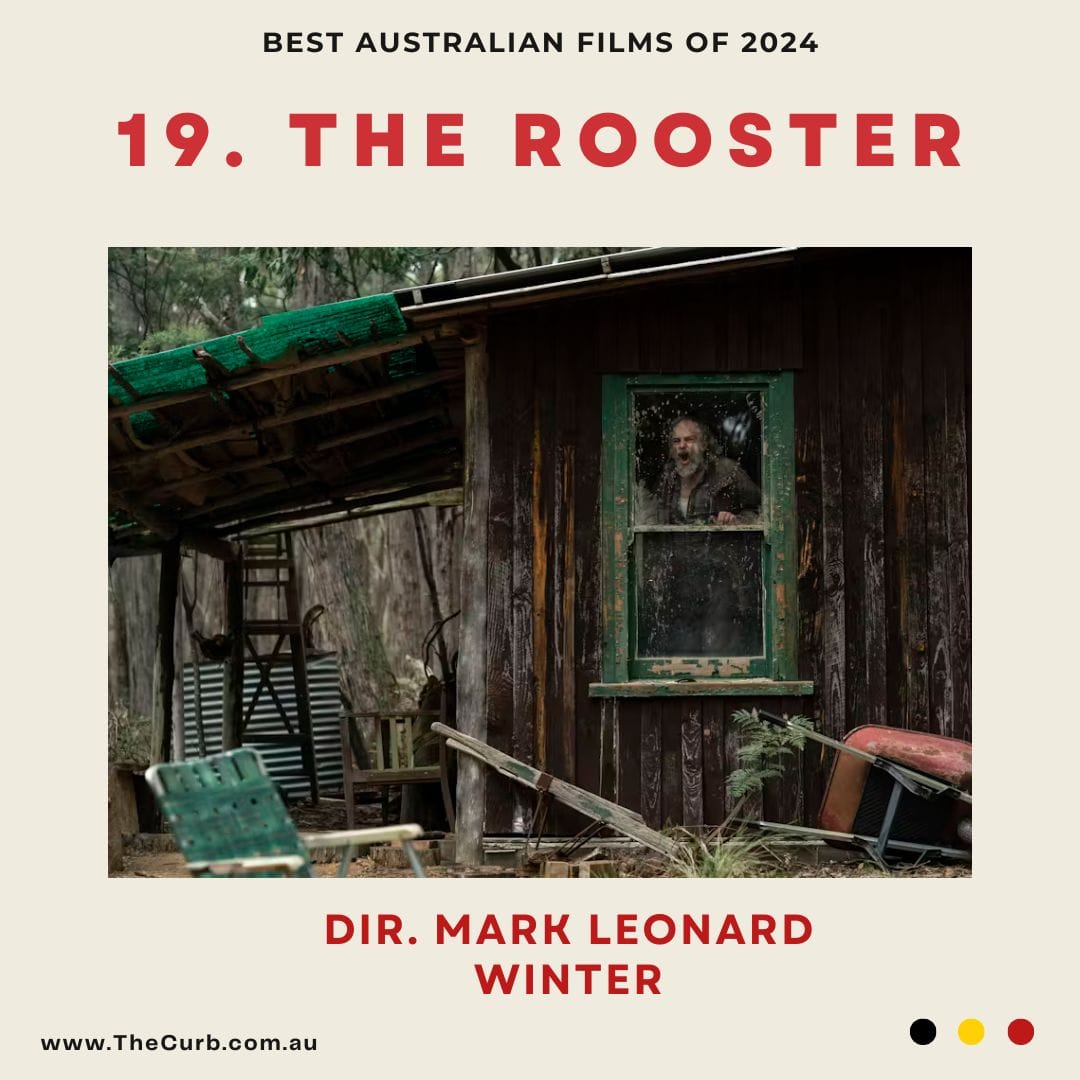
19. The Rooster Director: Mark Leonard Winter; Cast: Phoenix Raei, Hugo Weaving, John Waters, Rhys Mitchell; Producers: Geraldine Hakewill, Mahveen Shahraki; Writer: Mark Leonard Winter
What exactly is the purpose of a rooster? It’s a creature that exists to control and manage its flock, to keep it safe and protected from harm. Unruly roosters or surplus roosters are often culled to maintain a level of civility. For the noisy roosters who wake up suburbia as soon as dawn arrives, they get shoved in a box overnight so they can’t life their head up to crow. If we look for a human equivalent of a rooster, we might consider the role of a police officer or a father to be their equal. In Mark Leonard Winter’s debut feature, we meet two such roosters: Phoenix Raei’s Dan, a shell of a cop who struggles to stem the rise of suicides in his rural town, and Hugo Weaving’s hermit, a bearded figure who can’t escape the guilt of his past and lives in the bush, surviving on stolen booze and skerricks of food. If they were in their avian form, these two roosters might have ended up as dog food long ago, but they’re not birds, they’re men, and society has struggled to find a purpose for their broken brains. In this way, The Rooster acts as a defiant repudiation of awareness campaigns and blue trees in the middle of nowhere; what use is being aware that mental illness exists if the solutions aren’t solving the problem? For Dan and the Hermit, the solution is to stand in the forest and scream ‘oh no’ as the rain falls. It helps for some.
Read the interview with Mark Leonard Winter here.
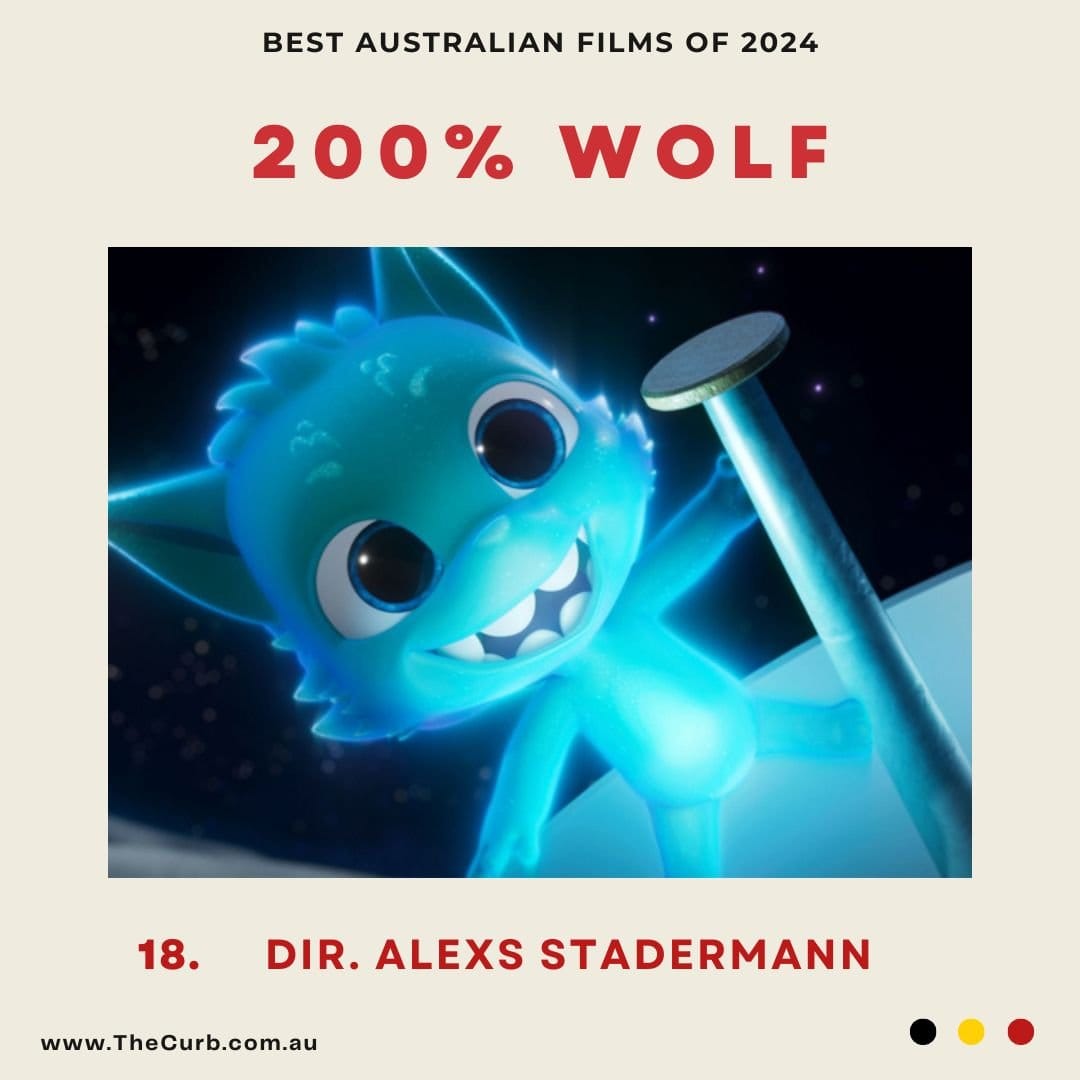
18. 200% Wolf Director: Alexs Stadermann; Cast: Ilai Swindells, Elizabeth Nabben, Samara Weaving, Jennifer Saunders; Producers: Alexia Gates-Foale, Tracy Lenon, Barbara Stephen; Writer: Fin Edquist
What a joy a fart joke can be. What an even greater joy a chorus of toots can be from the bots of werewolves and canine friends. 200% Wolf is guided by mindset that the miracle of bodily gases is one of life’s greatest joys, and when you tap into the infectious laughter that comes from having a portable trumpet in your pants, well, you make something that’s just about one of the most delightful kids films to come out of Australia in years. Ilai Swindells returns as Freddy Lupin, an energetic werewolf teen who turns into a pink-haired poodle and leads a wonderfully uplifting film about a lost moon sprite who needs to return to their home. Naturally, given the scatological undercurrent of the film, this moon sprite is called ‘Moopoo’, a blue, big-eyed baby which rivals Pixar for cuteness factor. 200% Wolf ramps up the inventiveness with a visual style that hits well above its weight. Bring on 300% Wolf.
Listen to the interview with Alexs Stadermann here.

17. Withered Blossoms Director: Lionel Seah; Cast: Stella Ye, Rachel Young; Producer: Miki Clarke; Writer: Lionel Seah
"People come and go. When it's time to move on, don't hold on for too long.” Lionel Seah uses the brevity of the short film format to explore the limited nature of time; we feel we have forever with the ones we love, but the truth is, they’re gone before we’re aware the clock has stopped ticking. Withered Blossoms is, on the surface, a story about duty to the elders in your family, but its truth is revealed in moments of connection between a granddaughter and her grandmother who she has held off visiting after a separation with her long-term partner. A stroll in the park, the act of bathing an elder, having that same elder then stroke your hair; all of this safety, this comfort, this tenderness from the one person who knows you best, leads to a final shot that breaks your heart completely and will have you wishing you could have just one more moment with your grandmother, just one second.
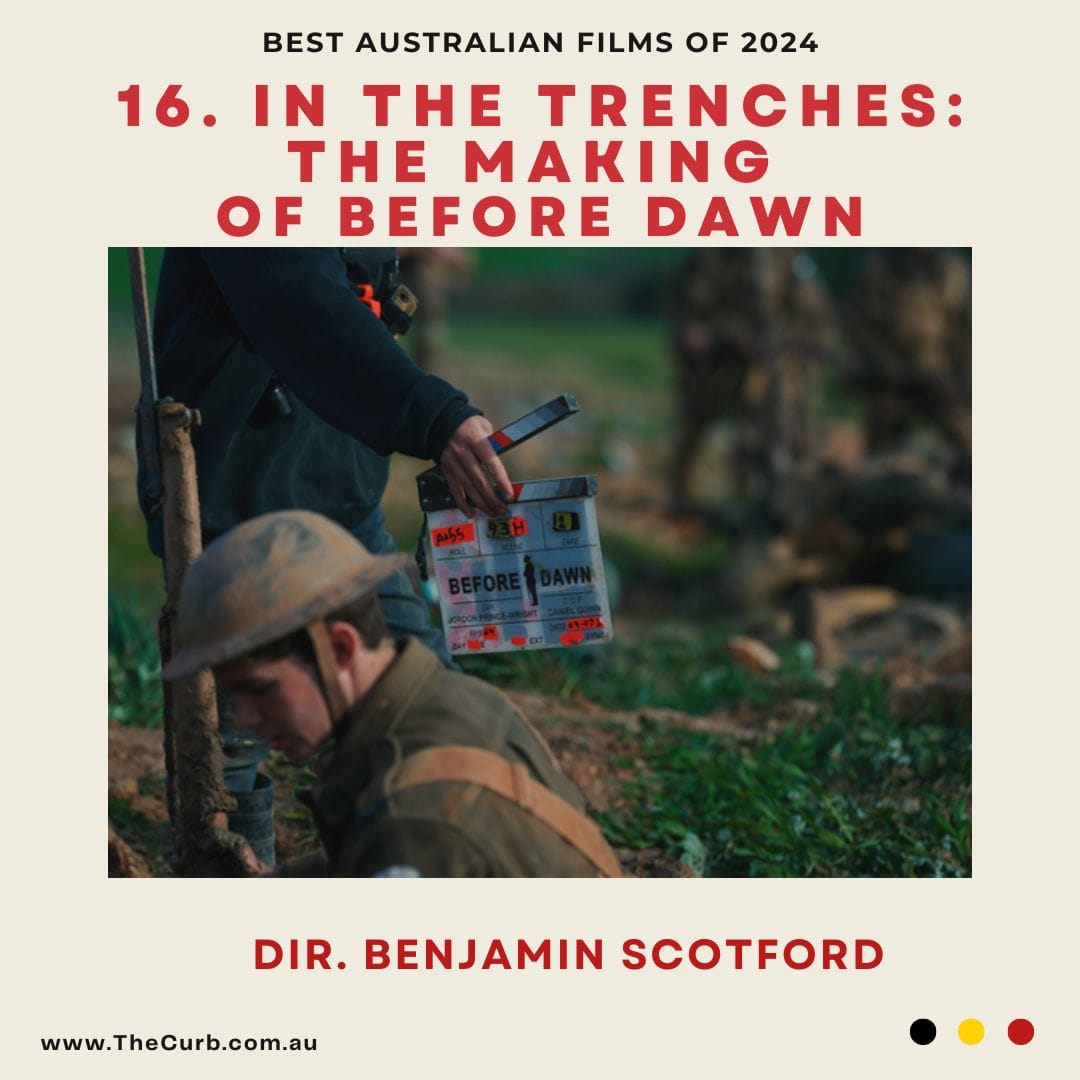
16. In the Trenches: The Making of Before Dawn Director: Benjamin Scotford; Featuring: Jordon Prince-Wright, Shane Day, Jeffrey Prince-Wright, Levi Miller; Producer: Benjamin Scotford
Benjamin Scotford is fascinated by how films are made. With his debut feature documentary In the Trenches: The Making of Before Dawn, he takes audiences behind the scenes of the biggest and one of the toughest independent film shoots in modern Australian history: Jordan Prince-Wright’s WW1 epic shot in Esperance. Granted access to all areas, Scotford is gifted some honest and earnest interviews with cast and crew, culminating in a captivating documentary that details the difficulty of making an independent film on a limited budget. Keen eyed readers will recall I was rough on Before Dawn, and my opinion of the film hasn’t changed much after viewing In the Trenches, but I was left impressed with the level-headed nature of Scotford’s editing as he navigates some of the trickier, fractious sections of the shoot. Unlike my harsh take on the film, Scotford isn’t seeking to tear anyone down with his documentary, instead he approaches it with a curiosity and level of admiration for the strength, will, and earnest nature that Jordan and his cast and crew pull together to make the impossible possible. Behind the scenes documentaries are a rarity in Australian film, so here’s hoping that Scotford is able to continue with his all-access filmmaking approach, and others follow suit too.
Listen to the interview with Benjamin Scotford here.

15. T-Blockers Director: Alice Maio Mackay; Cast: Joni Ayton-Kent, Chris Asimos, Stanley Browning, Lewi Dawson; Producers: Alice Maio Mackay, Erin Paterson; Writers: Alice Maio Mackay, Benjamin Pahl Robinson
Trans filmmakers (actors included) are a rarity in Australian cinema, leading emerging filmmakers like Alice Maio Mackay to form their own cinematic history on screen. With her acidic micro-budget meta-horror flick T-Blockers, Alice conjures a fictional history for her characters to lean on, while also referring to provocateurs like Gregg Araki and Ed Wood in the process. T-Blockers is a frequently subversive and a wickedly apt termination of toxic right-wing ideology, shown here in the form of a parasitic infection that turns its hosts (read: men) into goop covered, brain-rotted, anger filled blood bags. As the hero of the piece, Sophie (Adeline Ophelia Last) turns to a short film from the 90s to guide them towards being able to destroy the parasite. In her essential essay for Polygon on trans cinema released in 2024, Willow Catelyn Maclay[i] writes about T-Blockers saying “[it is] a salient picture that prioritizes the importance of available images to trans viewers, so that we may learn from our history and see ourselves in film.” There’s a radical embrace of the low-budget aesthetic that’s emerging throughout the trans film scene right now from filmmakers like Vera Drew (The People’s Joker) and Alice Maio Mackay, and through their eyes, the modern trans film archive is growing for future generations of trans filmmakers to refer to.

14. Runt Director: John Sheedy; Cast: Lily LaTorre, Jai Courtney, Celeste Barber, Jack LaTorre; Producers: Jamie Hilton; Writer: Craig Silvey
John Sheedy has a knack for creating wholesome, sweet, charming family films; you know, the sort that we adults say ‘gosh, they don’t make films like they used to.’ Runt is the kind of the film that ‘they used to make’. Craig Silvey adapts his own best-selling novel for the screen, and in the process retains the unbridled optimism of Annie Shearer (a luminous Lily LaTorre) as an amateur agility dog trainer who turns her scrappy stray pup Runt into a barnstorming success. Sheedy’s levity is buoyed by the presence of a screen-ready dog (Squid, the rescue terrier), a proper Heinz 57 pup who should inspire folks to adopt rescues. Set in the fictional West Aussie town of Upson Downs where a greedy businessman (no, not Coke) is stealing all the towns water and buying up the properties of families going bust. Earnest Annie and her inventive brother Max (Jack LaTorre) feel some of the burden their parents (light turns from Jai Courtney and Celeste Barber, two oldies who you’re certain would give great hugs) are holding, and both aim to lighten the load. Films can make things easier in life, and Runt certainly has the tools to lighten the loads of younger audiences who might be feeling the crunch of the cost-of-living crisis and feel like they need to solve the problem. Rest easy kids, it is a burden, but not yours to tackle right now.[i]

13. The Meaningless Daydreams of Augie & Celeste Director: Pernell Marsden; Cast: Frankie Gillespie McKay, Libby Segal; Producer: Sophie Booth; Writers: Gregory Kelly, Pernell Marsden
Pernell Marsden’s gift of a short film carries the song of Céline Sciamma by way of pitch black comedy down to this strange southern land we call Australia, and in the process, they conjure a poem that feels distinctly original and just off-kilter enough to be something worthwhile repeating. The Meaningless Daydreams of Augie & Celeste (what a title), is, as my good friend Nadine Whitney says, a story about ‘the strange complexity of girls and their friendships built to explode with the introduction of desire for men.’ Augie and Celeste live out on a farm, and with minimal ways of exercising their minds, they look for trouble in a field where they encounter a scarecrow. A kiss quickly turns into Augie being ‘with child’, and the immediacy of the complications of living in the body of a young woman eventuate, with everything from a child that rivals little Otik, to faux-fur jackets, to red lipstick, all to a thumping electro score from Alex Olijnyk. Throw in a touch of jealousy into the mix, and you’re left clapping at the end with a clear conclusion: burn it all down. Gosh, I love this film. Someone find Pernell Marsden a wealthy, yet ailing, billionaire eager to bankroll their vision. We need it in the world.

12. Better Man Director: Michael Gracey; Cast: Robbie Williams, Jonno Davies, Steve Pemberton, Alison Steadman; Producers: Paul Currie, Jules Daly, Coco Xiaolu Ma, Craig McMahon; Writers: Simon Gleeson, Oliver Cole, Michael Gracey
Yeah, ok, so Robbie Williams is played by a CGI ape in this film. We get it. But, once you get past the immediate ‘what the fuck’ response to the concept of Better Man, you’re left to engage with an audacious, rule breaking biopic full of cheek and charm and a surprising level of vulnerability and openness about the difficulties of being a bloke in a boy band, then the complications of being set free from that world and let loose as a solo figure who listens to nobody when they say ‘no’. Better Man follows the Rocketman mindset of embracing a level of ugliness about its subject, then working towards owning the mistakes, and ultimately, being proud for being having tried in the first place. Aussie director Michael Gracey shows that he knows how to stage a musical number with the rip roaring Rock DJ sequence which instantly stands as one of the finest moments in modern musical cinema; a jaw dropping visual extravaganza of excess and excitement as dancers flood the streets of London with pitch perfect choreography. Yeah, the Australianness of it all might be in question, but since 2003, we’ve embraced Robbie Williams as one of our own. As he recently said, “I come down there and I feel as though I’m an every man to everybody,” and that’s the best summation of Better Man you can get.

11. Memoir of a Snail Director: Adam Elliot; Cast: Sarah Snook, Kodi Smith-McPhee, Jacki Weaver, Dominique Pinon; Producers: Adam Elliot, Liz Kearney; Writer: Adam Elliot
Adam Elliot invites adults once again into the interior lives of his creations, opening the door to empathy and understanding, with his latest gem Memoir of a Snail. It feels almost expected to say that you can feel the warmth of human touch in each frame, but the truth is that the stop motion animation is only one source of that warmth. First there's Adam's script, divined from his friends and fellow citizens alike, donning respect and affection for the souls, like me, who find life just that little bit challenging and difficult to navigate. Then there's the Aussie twang of Sarah Snook who brings Grace Pudel to life with a lived in sensibility; her Grace is a shaken figure seeking a place in the world where there's some aspect of affection and appreciation that she is alive within it. Then there's the way that Elliot honours Canberra and the regional towns of WA as an ode to the undervalued and underappreciated places in Australia; these areas are as distinctly off kilter as his characters are, and if you're not already on board with their eccentricities (I say this as someone who is a Canberra-faithful) before the film, then it's quite likely you'll be signing up for a Canberra Film Festival membership afterwards. (Although your appreciation for sandrgroper apples might sour a little.) Elliot sees the world through a lens of pain and sadness, but on the other side of that sorrow is a positivity that things might just get better.
Listen to the interview with Adam Elliot & Sarah Snook here.

10. Yeah the Boys Director: Stefan Hunt; Cast: Neven Connolly, Kieran Crowe, Hadley Davidson, Jackson Garcia, Jordan Hill, Rob McLean, Bailey Spalding; Producer: Alexandra Taussig; Writer: Vanessa Marian
Saying more about the forms of Aussie masculinity (good and bad) in the space of eight minutes than some features attempt to do in 138 (looking at you Joker: Folie à Deux), Yeah the Boys takes us through a night on the turps with the mates as they sway and tussle their way through a flowing dance routine. Playing out as a boozy ballet, Yeah the Boys butts up against the concept of the version hyper-masculinity that's found in Australia - read: loud, violent, bullish behaviour - as the nameless figures sway, swoon, and tenderly support each other as they get on the beers for a night they may not remember. Aurally supported by a pulsing score from The Avalanches which throbs and shifts organically with their movements in an act of synchronicity, Yeah the Boys does what more films should do: embrace the emotionality of dance and movement, and tap into an under explored language in the process. Yeah the Boys is a fantastic realisation of creativity let loose, embracing Australiana, warts and all.
Listen to the interview with Stefan Hunt & Vanessa Marian here.

9. Flathead Director: Jaydon Martin; Cast: Cass Cumerford, Miguel Angel Jitale D’Amico, Rob Sheean; Producer: Jaydon Martin, Patrick McCabe; Writers: Jaydon Martin, Patrick McCabe
There's change afoot in the Aussie film scene in the form of Jaydon Martin, Brodie Poole, Adam C. Briggs and Sam Dixon. From General Hercules, to A Grand Mockery (keep an eye out for this in 2025), and then Flathead, a docu-fiction hybrid experience that is drenched in stunning black and white cinematography (Poole, again) that leaves its characters starkly exposed as they seek some form of salvation. Cass Cumerford returns home to Bundaberg seeking redemption and maybe a salve for his ailing body. What he finds is a town transformed by religious folks with nobody left to convert, blokes with guns and nothing to shoot, and an unanswered question about the sake of existence. Stuffing chickens on spikes, inheriting local fish shops, or scouring the land to bum a smoke, this is the life of Bundaberg, a place where you don't willingly go to die, and you certainly won't be reborn there either. Martin's film lingers in between reality and fiction, it's an occasionally Gothic experience that causes you to wonder: what birthed this land to begin with? Flathead, alongside General Hercules and A Grand Mockery, shows a movement of filmmakers eager to try and answer that very question, and in their response, we're seeing Australia as it is: a place of festering despair with glimmers of humanity shining through.
Listen to the interview with Jaydon Martin here.

8. Audrey Director: Natalie Bailey; Cast: Jackie van Beek, Jeremy Lindsay Taylor, Hannah Diviney, Josephine Blazier; Producers: Diya Eid, Dan Lake, Shannon Wilson, Michael Wrenn; Writer: Lou Sanz
Caustic comedy rains like refreshing acid rain in Audrey, a film that grabs your throat with noxious laughter and then cackles alongside you as you feel the giddiness rise in your mind. I live for films like Audrey, where selfish people do selfish things throwing the people they're meant to love under their feet, walking over them on the path to glory. What sets films like Audrey apart from the many tales of millionaires doing the same thing is that they're often about underdogs; underdogs who turn rabid and tear themselves apart. Audrey sits alongside great pitch-black comedies like Bobcat Goldthwaite's World's Greatest Dad and Jason Reitman's Young Adult. Films about self-serving individuals who refute the notion that a character needs to grow along the journey of the film. I really don't care if this film isn't for everyone, because selfishly I feel it was made just for me.
Read the interview with Natalie Bailey here.

7. Jason is My Dad Director: Ashley Zukerman; Cast: Darren Gilshenan, Jagger Serafin, Georgina Naidu; Producers: Pat Mooney, Rachael Morrow, Ashley Zukerman; Writer: Ashley Zukerman
In Ashley Zukerman’s masterful short Jason is My Dad, modernity encounters the fading motions of the past as Darren Gilshenan’s uber driver picks up Jagger Serafin’s private school kid as he ticks off his obligation as a youthful paper delivery kid. Now, instead of every house getting a paper delivered, it’s every fifth or sixth house on the run, making the act of walking or riding along the paper route redundant. Gilshenan’s driver takes the opportunity to act as an impromptu uncle to the kid, dolling out fatherly advice that is completely ignored. Zukerman’s script is an uncritical one, engaging in an act of observation of how the past lives in the present, all the while younger generations are oblivious to histories continued existence in the now. There’s no critique or condemnation of the uberifcation of the world, just an understanding that this is the way of the future. What results is a film that is quietly heartbreaking in its exploration of the service industry, a note accentuated with Darren Gilshenan’s quiet resignation of his final line that says ‘don’t mind me, I’m just the uber driver.’ We’re beyond lucky to have an actor of Gilshenan’s calibre working in Australia right now, someone who is delivering soul-exposing performances in films like Christmess and now Jason is My Dad.

6. Winhanganha Director: Jazz Money; Featuring: Jazz Money; Producer: Elena Guest; Writer: Jazz Money
Of late, Australian archival documentaries have exposed the mangled history of this nation for what it is: a cruel foundation of colonisation, built to dismantle and disrupt the continued connection to land and culture that First Nations people have. Poet, artist, and cultural historian Jazz Money utilises archive in Winhanganha to explore the impact of colonisation through collected media, and in doing so, she creates a work of art that is both an act of protest and a movement of celebration for Aboriginal and Torres Strait Islander folks. Winhanganha is tied together with Jazz Money’s poetry which links in chapters the sequential footage gathered from the under-explored NFSA collection, all of which acts as a dialogue that reminds us that Aboriginal and Torres Strait Islander ‘exist far beyond the colonial gaze.’[i] Winhanganha then acts as a critique of the way archives are built and the form of footage that is stored and collated under catalogue items like ‘First Nations stories’. In the act of exposing these archives, we are forced to reconcile with the notion that an archive is a ‘non-neutral’ vessel, built on prejudices (conscious and unconscious) and societal perspectives that are yet to be fully dismantled. Winhanganha is the first work commissioned by the NFSA, and it's in that commissioning process that the organisation has opened itself up to a collaborative process that seeks to make sense of the archive which it has inherited. In doing so, it comments on the collaborative and expansive way that archives can be used to further the voices of storytellers whose histories are contained within them. Winhanganha is a vital examination of how Aboriginal and Torres Strait Islander stories are told on screen; it arrives at a time where the First Nations new wave is peaking.
Read the interview with Jazz Money here.
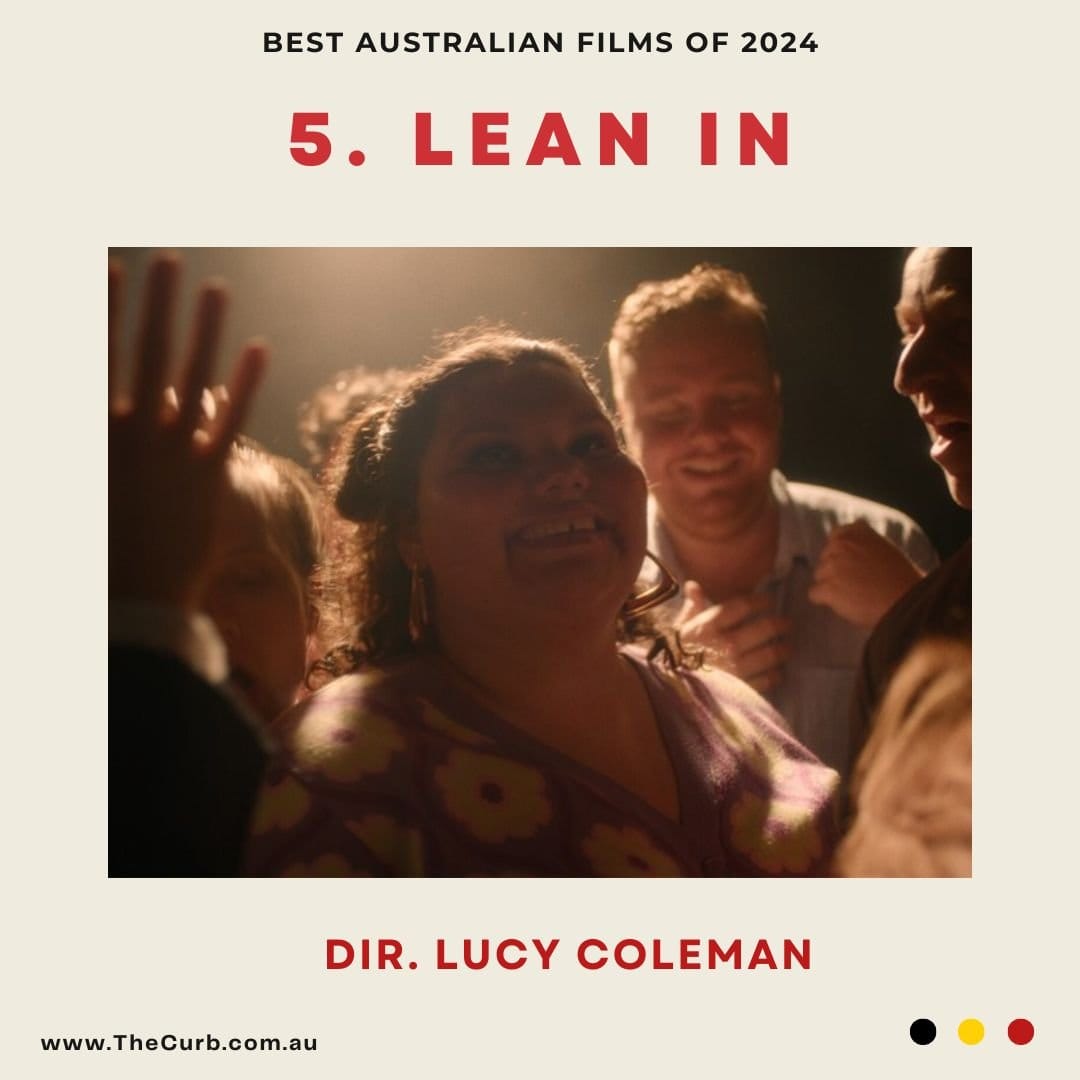
5. Lean In Director: Lucy Coleman; Cast: Kartanya Maynard, Kevin MacIsaac, Jack Scott, Liam Greinke, Jess Harris; Producers: Lucy Coleman, Lucy Hayes; Writer: Lucy Coleman
With Hot Mess and now Lean In, writer-director Lucy Coleman has exposed her preternatural ability to both critique and engage in how Australian comedy treats emerging women comedians who are delivering what the industry vocally says it wants in media statements, but actively rejects when it comes to commissioning and supporting new talent. Lean In brings us Rach, the phenomenal Kartanya Maynard, an emerging feminist comedian who finds herself $10k in debt after her politically charged show is rejected by a manager who encourages her to ‘just go on antidepressants. You won’t care as much.’ As Christmas nears, she goes out on the town with her brother and bevvy of finance industry blokes who openly say whatever they want. Yet, when Rach does it, she’s told she lacks ruthlessness. Lean In exposes the double standards of the industry, where women are verbally applauded for having ‘integrity’ while blokes are career-boosted for blatant misogyny and being cunts. Coked up and full of booze, Rach is presented with a job offer that demands a level of sociopathy; the echo of her earlier statement that she doesn’t want a soul, she just wants money lingers as she delivers a roast for the ages that is bitterly, bleakly comedic while also exposing the laughing audience member for their level of acceptance for darkness. There’s pain in Lean In, pain driven by the lengths women have to go to be funny and be respected for being funny in this deeply misogynistic world. The lack of an AACTA award nomination for what is one of the finest short films this nation has seen in decades is more of a condemnation for the state of the industry than anything else. Be better Australian film industry. Stand by your values.
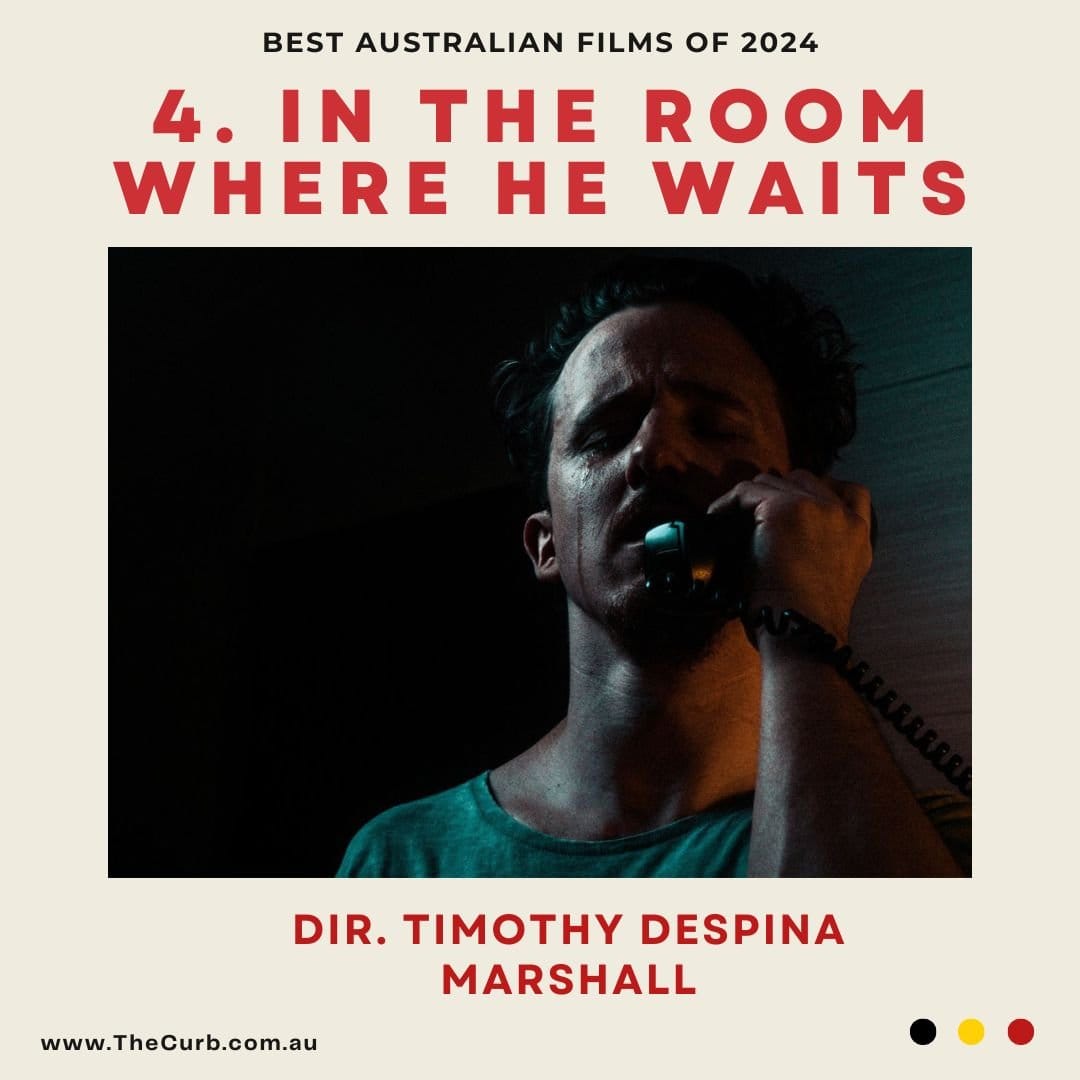
4. In the Room Where He Waits Director: Timothy Despina Marshall; Cast: Daniel Monks, Susie Porter, Annabel Marshall-Roth, Anthony Brandon Wong; Producers: Bec Dakin, Timothy Despina Marshall; Writer: Timothy Despina Marshall
With In the Room Where He Waits, Timothy Despina Marshall has crafted one of the definitive texts about the COVID era of our lives, presenting a form of loneliness, heartbreak, and despair that many felt on a global level. Daniel Monks gives the performance of his screen career[i] as Tobin Wade, a young queer disabled actor who slinks back to his home of Australia to attend the funeral of his father, all the while enduring the breakdown of his long term relationship. He is also in the midst of rehearsals for an upcoming New York production of The Glass Menagerie, with table reads being held via Zoom, meaning that Tobin is able to hide his down under location. Outside of these brief digital connections, Tobin is alone, trapped in his small hotel room, waiting for the tick, tick, tick of the isolation period to be over. He engages in Grindr roulette, chatting with body obsessed men, knowing he’ll never be able to meet them. Masturbation only kills so much time, and it’s in those other moments that he grows to realise that he’s not alone. Another man’s shirt, underwear, and cuff links appear in the room; then another man appears, lingering in the corner, then in the bathroom. In the Room Where He Waits utilises loneliness to build tension, accentuating moments of tangible fear that arise as Tobin is in his most terrified state, struggling to open a door, frozen stiff by what may reside on the other side. Yet, it’s the moments where Tobin paces the room, doing exercises, flitting on Grindr, and lying in his bed that we feel him at his most vulnerable. Daniel Monks stuns in these solitary moments, allowing his disabled body to expose the text of the film: is Tobin doomed for a life of disabled, queer loneliness? Or, when his isolation period is over, will he be accepted in the world for who he is? In the Room Where He Waits is a film driven by mood and atmosphere, implementing a soundscape that hollows out your existence while watching it. Timothy Despina Marshall strips back as much of the text as possible, ensuring that you feel as lonely as Tobin does during this riveting and complex experience.
Listen to the interview with Daniel Monks here, and read the review for In the Room Where He Waits here.
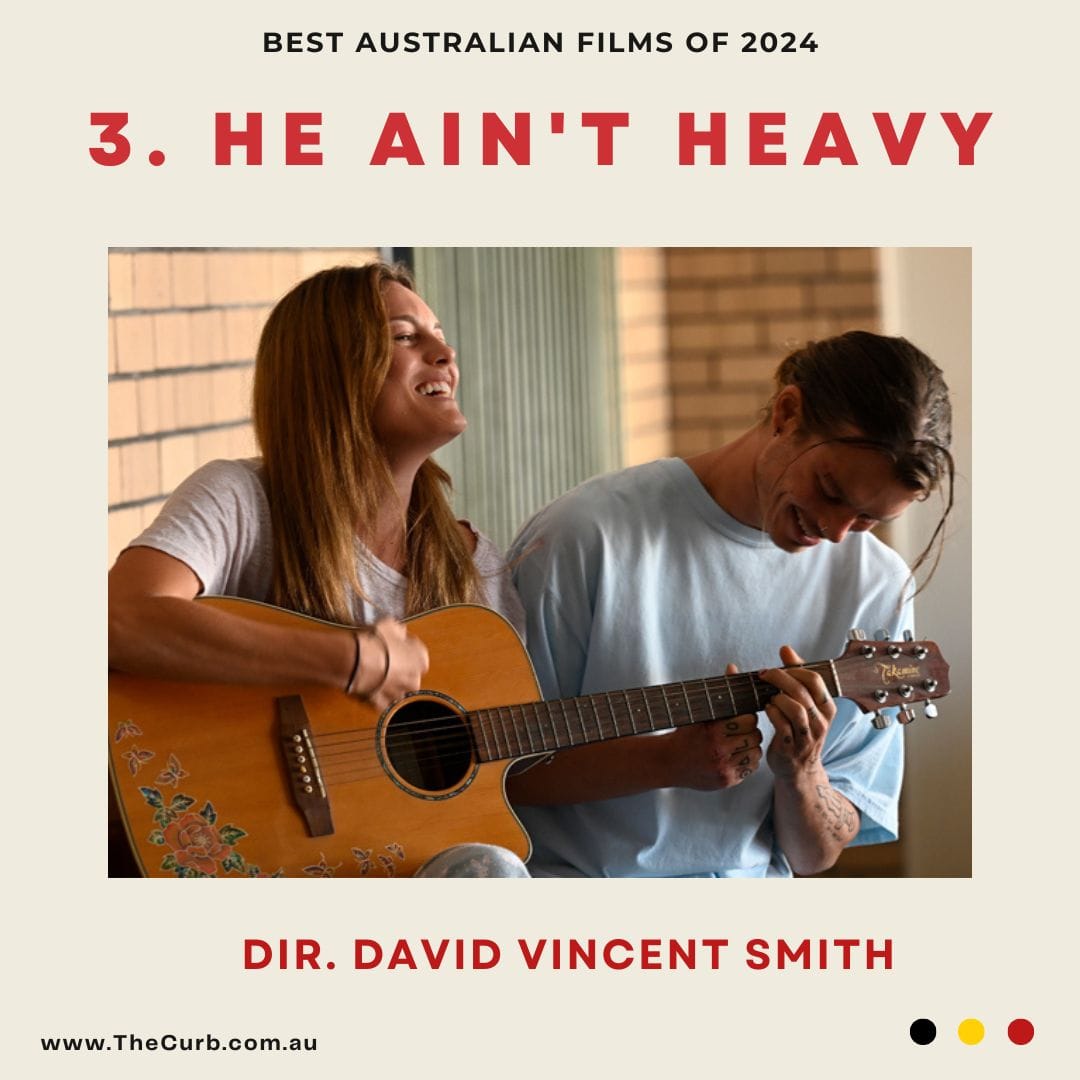
3. He Ain’t Heavy Director: David Vincent Smith; Cast: Leila George, Sam Corlett, Greta Scacchi, Alexandra Nell; Producer: Jess Parker; Writer: David Vincent Smith
David Vincent Smith’s debut feature is a film built on trust. Trust with his cast. Trust with his crew. And, most importantly, trust with his audience that they will be with him on a deeply personal, emotionally wrought narrative inspired by a true story. At its core, He Ain’t Heavy is a love story. It’s a story about a sister, Jade (Leila George), and her wayward brother Max (Sam Corlett in a pivotal performance in his career), who she drugs and kidnaps and locks away in their grandmother’s vacant house to enforce a form of rehab on him. Cold turkey barely covers what Max endures, but the pain and suffering that his addiction has inflicted upon his family has been much worse. Their mum, Bev (Greta Scacchi), is a shell of her former self, a warm shoulder now resigned to a solitary state, locking herself in the kitchen whenever Max comes by to pilfer her money, belongings, or as we see in the harrowing opening, her car. But, again, He Ain’t Heavy is a love story. It’s above the love between siblings and how that bond never disappears, no matter how heinous or fractious the actions caused by one’s addiction may be. It’s easy to read this kind of synopsis and push off against it, to shut yourself off from the emotional journey a film like this takes you on, but to do so would be to deny yourself one of the truly great Australian feature debuts from writer-director David Vincent Smith and producer Jess Parker. He Ain’t Heavy cracks open the mental health crisis that Australia is facing right now, exposing the impact that alcohol and other drugs have on fragile folks, and asks, how can we make this better? Again: this is a love story. Through compassion, through empathy, and through a drive to bear witness to the pain that others are carrying is just one way forward.
Read the review for He Ain’t Heavy here and the interview with David Vincent Smith here.
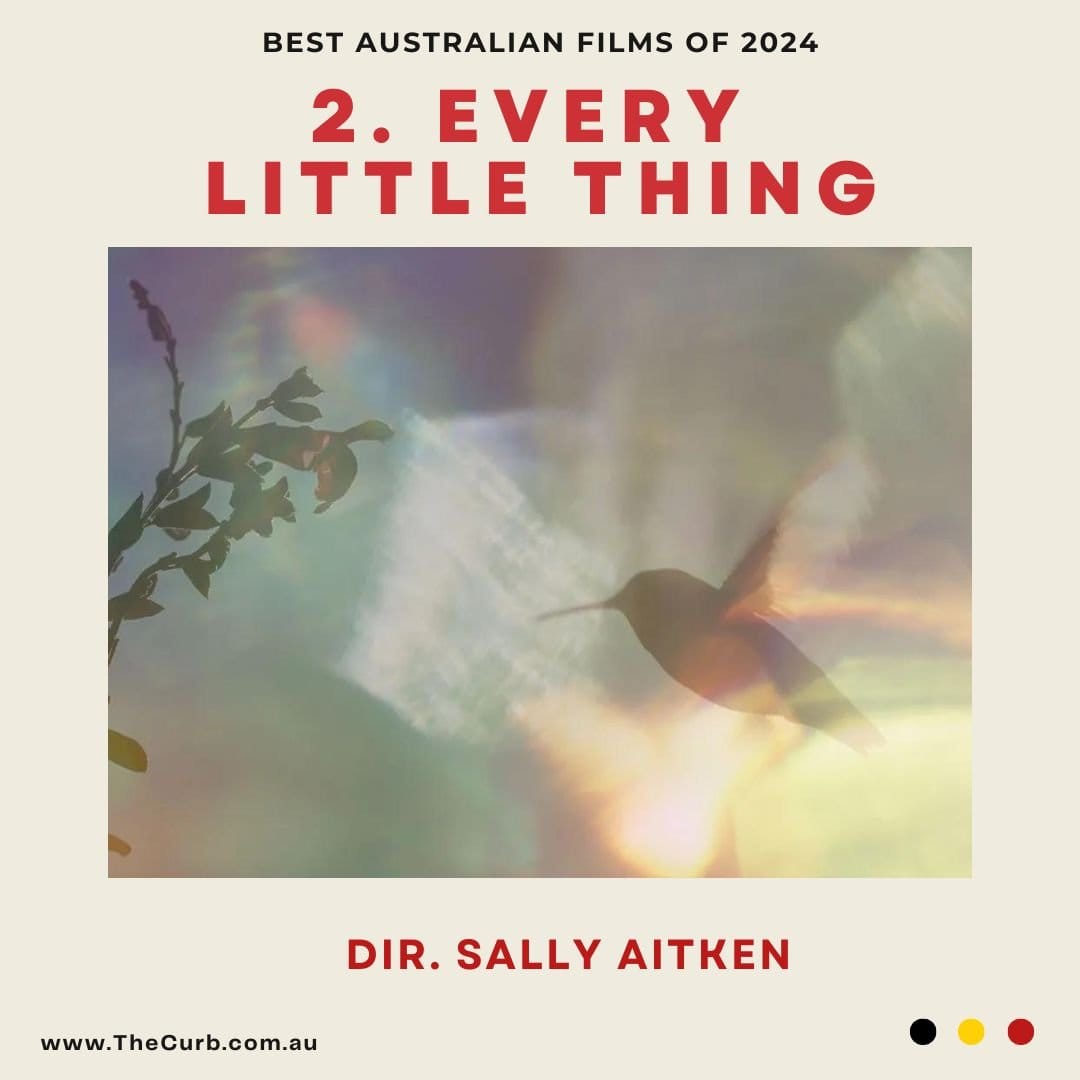
2. Every Little Thing Director: Sally Aitken; Featuring: Terry Masear, a lot of hummingbirds; Producers: Bettina Dalton, Anna Godas, Oli Harbottle; Writer: Sally Aitken
Seeing Sally Aitken’s immersive documentary Every Little Thing in a cinema is akin to having a spiritual moment. The collaborative cinematography of Nathan Barlow, Dan Freene, Ann Johnson Prum, and Jason Daniel Shaw, brings you intimately into the world of Terry Masear and her humble hummingbird rescue facility in the Hollywood hills. When projected in a cinema, we’re gifted with a worldview that feels extraordinary and decidedly unreal. Surely the ripples of the metallic sheen across their feathers can’t be organic? Surely their ability to hover on the spot and precisely pivot themselves to get into that delicate flower for food has to be mechanical? But, no, as we’re invited to watch these hummingbirds go through a rehabilitation process, we’re equally invited to witness the magic of nature play out. These are words which, throughout the years, have almost lost meaning because of the amount of times they’ve been used as throwaway superlatives to describe yet another nature documentary or TV series; but under the guidance of Sally Aitken and with the gentle, considered narration and care of Terry Masear, we’re shown why those words are important and what they truly mean.
Every Little Thing is an ode to tenderness and support; a poem for those who dedicate their lives to tending to the smallest creatures in the world, hoping to make it a better place for just a little bit longer. In one of the many scenes that will elicit tears of wonder, Terry buries two of her hummingbird patients, their tiny bodies barely fitting into the palm of her hand. She talks about how in less than a month they will be reclaimed by the soil, as if they never existed in the first place. Yet, their presence is deeply felt in the environment of Hollywood, and, if you’re lucky enough, that presence will be felt by you as you sit in the cinema (or at home) watching these minute, majestic creatures exist. The world is a marvellous place, and when we take the time to admire it, we are left to wonder, why don’t we respect it more? Every Little Thing is the purest gift that cinema can offer.
Read the review for Every Little Thing here or listen to Sally Aitken talk about the film here.
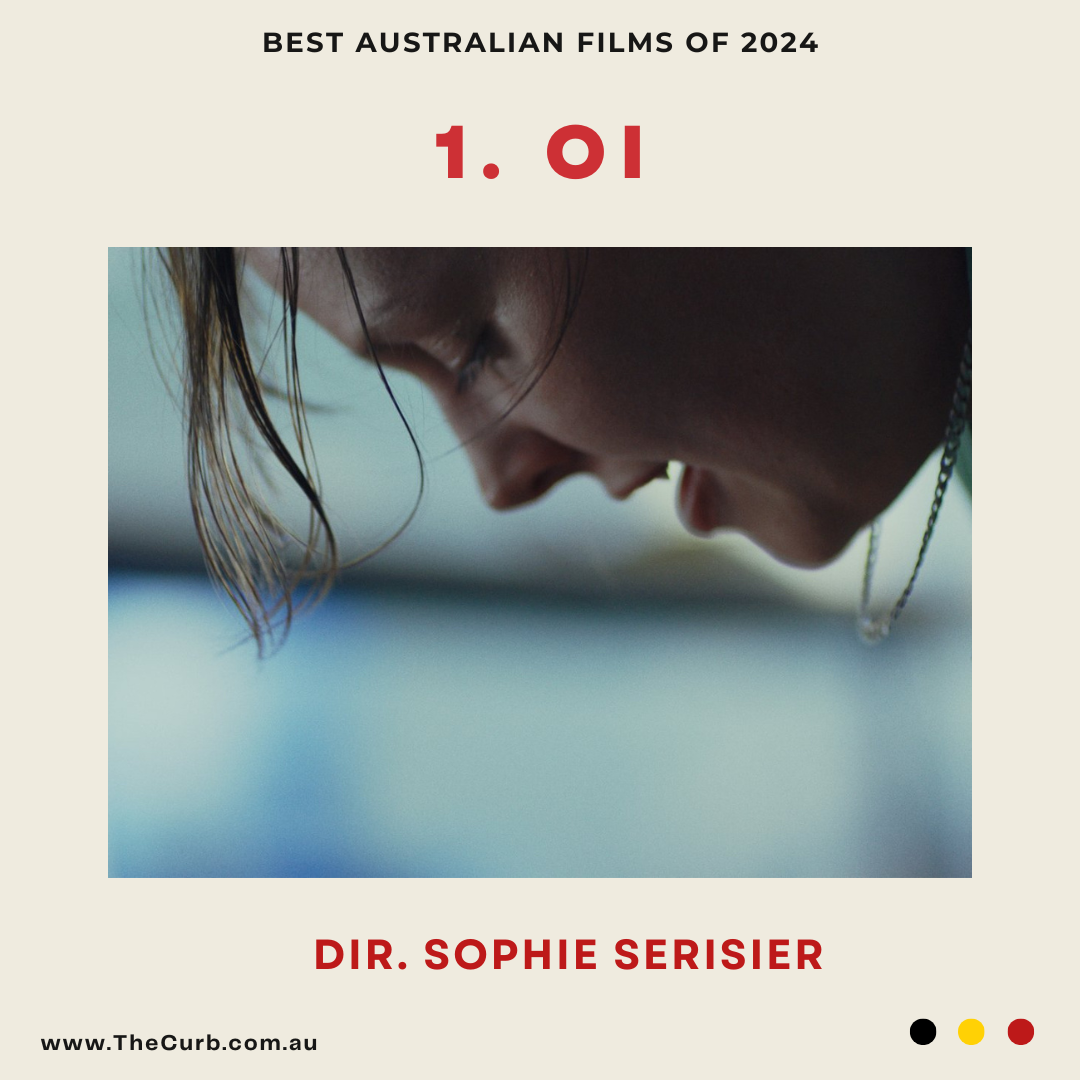
1. Oi Director: Sophie Serisier; Cast: Laneikka Denne, Davida Tal, Ella Prince, Fraser Crane; Producer: Monique Placko; Writer: Laneikka Denne
What a year Laneikka Denne has had.
With the aftershock of David Robinson-Smith’s double punch of Mud Crab and We Used to Own Houses still being felt, Denne (they/she) then further made their mark on Australian cinema with Tatjana Hamilton’s furious and filthy Bottleneck and in Chris Elena’s exemplary Passion Pop as a ‘random lesbian’. Laneikka received development funding for their documentary The Real Meaning of Pleasure, where they once again are collaborating with two of Australia’s finest screen voices, Adam Finney and Gabriel Murphy. This is without even mentioning their soul-shaking performance in Parish Malfitano’s delicious horror-melodrama, Salt Along the Tongue. (Keep an eye out for that film to feature in my 2025 list, but if you wish, you can always take its mention here as a joint placement alongside Oi. It’s that good.) I haven’t even touched on the accolades and work that Laneikka is doing in the theatre space, having previously won the State Theatre Company of South Australia’s Young Playwright Award for deadskin (soon to be adapted into a feature film), but I’ll let you read all about that on their website.
All of this is to say that Laneikka Denne’s collaborative work with director Sophie Serisier on their short film Oi, which Laneikka wrote, is precisely the kind of work that makes me sit up and say extravagant lines like ‘this is the future of Australian filmmaking’. You know, the kind of stuff that publicists take and put on a poster, or something like that. I’ve watched Oi some six times now, and each time I notice a little bit more about the layers that Denne and Serisier have embedded into the text of the film. This is all borne from Laneikka’s script, but there’s a lot more to it than that.
Laneikka has written about Gen Z being the queerest generation before in their considered essay about the need for intergenerational queer conversations on Refinery29, where she writes:
“While Gen Z might be the queerest generation on paper, statements like these often disregard the violence, oppression and abuse that older people have fought against in order for us all to safely identify as queer in Australia. It’s time we recognise that.”
Oi is a short film that carries that concept as one of the underlying themes of emerging queer identity. While it is safer to identify as queer in Australia, that sense of oppression lingers long in the classrooms and living rooms we so regularly spend time in. These walls talk, and while they may bear paintings of galloping horses, they murmur about the past and it hovers in the air, just out of reach, but still keenly felt, if not always understood.
Violence and sex are closely entwined here, with Serisier and cinematographer Julius Koivistoinen positioning bodies in ways that accentuate their similarities, and in turn, informing the level of tension (sexual and mental) that sits under the surface of these growing minds. Two pinkies intertwined, thumbnails being teethed in mouths, napes of necks in fights and embrace, or even the basic sight of a teen girl holding a lime Splice; these images are weighted with expectation, attraction, and the weaponisation of sexuality against women and non-binary folks.
Oi is a circular experience, utilising a structure often employed by feature films: the flash forward. Within a minute, we’re vomited into the climax of a fight, witnessing Laneikka Denne’s Jasmine laying into another teen; someone we grow to understand is going through their own form of internal pain as they process their own affection towards Jasmine and face the difficulties of getting her to just notice that she exists. The mixed-gender room is cheering in the background, living up in the anger of two girls fighting one another, the room fully aware of the subtext between these two teens; one who clearly likes the other, the other oblivious to that yearning. Jarrod Young’s editing lurches us from moment to moment, and when we later revisit and then exit that scene, we’re flung into the next moment with a half-heard car horn that emotionally jolts us once more.
Oi erupts with urgency, with Serisier presenting a vivid realisation of sex, sexuality, desire, and the core thing that underpins that whole internal maelstrom that’s unfurling in teen bodies: identity. Denne’s script presents the juvenile nature that sexuality plays out, where it’s still in a disposable state because the person living with it doesn’t fully know how to grapple with its complexities, even though it is the only thing that matters in the world. We feel the immediate pain and regret as Jasmine spits at another ‘get away from me you dyke’; they know the cruelty in that word, and the pain it can cause, but they only use it as they are wrought with fear.
Jasmine’s pain is palpable, realised in classrooms, the playground, and the streets of society. There’s also no clear path to solving this pain, even when an elder queer says ‘you can talk to me’, you can feel that the only logical response is to just cry, and even then that’s almost too painful. After all, how to do you even begin to talk through these emotions? Is it by giving someone you fancy a lime Splice? Is it by then taking that gifted lime Splice and imitating a sex act on it because that’s one of the few ways teens know how to show affection?
Here, Denne’s script exposes how rampant sexuality is employed by teens – and society as a whole – as a form of communication, while also showing how it is weaponised against feminine presenting people. One scene in a classroom shows the students spurred into a chorus by the moaning from a boy. One by one, students join in their vocalisation of faux throes of ecstasy. The teacher reaches her breaking point, circling out Jasmine for the room’s actions. Women are blamed, while men move through life unscathed.
Then there's Laneikka Denne, the actor, who brings Jasmine to life with a firecracker energy that is imbued with a lived in understanding of what it means to be young, queer, and oblivious to your future. One day Jasmine will be that person washing her own red car and she'll become the object of affection for a young queer teen grappling with emotions they don't fully know how to comprehend and then she can support them too, much like this film does. Denne’s Jasmine is a complex being, with all these truths existing at once, unconsciously fritzing in Laneikka's mind as the scene plays out. This is not acting. This is living.
But then there’s that title – Oi – and the way it’s peppered throughout the film: on the basketball court, on the bank of a lake when Jasmine flashes her faraway friends after yelling a guttural ‘oi’ in the dark, or just a basic ‘oi, get me some lunch’; it’s everything. It’s multi-textual, carrying multiple meanings at once, just like the film itself. Over the space of fifteen minutes, we’re gifted a layered experience about how sections of Gen Z are living through their self-realisation of queer identity.
Gen Z might be the queerest generation, with acceptance for gender diversity, sexuality, and sexual fluidity more visible than it’s ever been; but that doesn’t mean that the path to self-acceptance is an easy one. This is still a patriarchal world driven by a noxious media landscape which inflicts unspeakable cruelty on transgender folks, non-binary folks, and anyone who dares embrace their queer identity. Yes, it's easier to be openly queer in Australia, but the air of queerphobia is not far away.
Love is love, and queer pride is beautiful, but that path to understanding and accepting your own queer love is a bloody hard one; that’s part of what sits at the core of Oi and why it resonates so strongly, viewing after viewing, long after that pained final embrace has skirted off the screen.
Oi is filled with an urgency and a drive to get this story into the world. That urgency is also clearly something that underpins Laneikka Denne’s creative energy; again, watch Salt Along the Tongue when it arrives in the world and you’ll see more of their versatility at work; work that sees them part of a growing new-Queer screen identity for Australian cinema. Laneikka wrote about Salt Along the Tongue in their Letterboxd review saying: “This does not feel like it was made in Australia in all the right ways,” and the same can be applied to Oi, even though Oi is distinctly Australian in text, tone, and language.
I’ve barely scratched the surface of what is going on in Oi. It is, to me, maybe the most vital piece of Australian filmmaking to come out of 2024. It is, quite simply, the reason why I continue to do the work that I do with the Curb. You never know when a Parish Malfitano, Sophie Serisier, Chris Elena, David Robinson-Smith, or Laneikka Denne will emerge and knock you off your feet. Yeah, that’s another one of those throwaway lines that us film writers like to use, but if I’m completely honest, I haven’t been able to get up off the ground after my first viewing of Oi, and I’ve grown quite comfortable where I am now. I hope I never get up.
[i] While Force of Nature didn’t hit the box office heights of The Dry, it did well enough to comfortably find a place in the top 100 Australian feature films of all time.
[i] You should definitely buy yourself one of the best books of the year, Corpses, Fools and Monsters: The History and Future of Transness in Cinema by Willow Catelyn Maclay & Caden Mark Gardner.
[i] A short anecdote: When I viewed The Substance in cinemas, a woman arrived just before the bloody climax. She sat through the grue and gore as geisers of blood spewed over an auditorium before getting up and walking out, muttering to herself ‘this isn’t Runt’. I hope she eventually got to see the far less bloody and a little more wholesome film.
[i] Jazz Money puts it far more eloquently than I ever could on their site here: https://www.jazz.money/winhanganha
[i] Monks is an established stage actor, having received a nomination for the 2018 Helpmann Award for Best Male Actor in a Play for the Malthouse Theatre presentation of The Real and Imagined History of the Elephant Man, and having won the 2020 Best Performer in a Play at The Stage Debut Awards for his performance in Teenage Dick.
Click on over to the next page to find out where you can view the Best Australian Films of 2024.
Where to watch the Best Australian Films of 2024 in Alphabetical Order
200% Wolf
Director: Alexs Stadermann; Cast: Ilai Swindells, Elizabeth Nabben, Samara Weaving, Jennifer Saunders; Producers: Alexia Gates-Foale, Tracy Lenon, Barbara Stephen; Writer: Fin Edquist
Streaming Availability:
Audrey
Director: Natalie Bailey; Cast: Jackie van Beek, Jeremy Lindsay Taylor, Hannah Diviney, Josephine Blazier; Producers: Diya Eid, Dan Lake, Shannon Wilson, Michael Wrenn; Writer: Lou Sanz
Streaming Availability:
Better Man
Director: Michael Gracey; Cast: Robbie Williams, Jonno Davies, Steve Pemberton, Alison Steadman; Producers: Paul Currie, Jules Daly, Coco Xiaolu Ma, Craig McMahon; Writers: Simon Gleeson, Oliver Cole, Michael Gracey
Streaming Availability:
Cordelia, Daughter of the Sea
Director: Maddie Grammatopoulos; Cast: Luca Asta Sardelis, Renato Musolino, Jack Wong; Producer: Madison Siegertsz; Writer: Maddie Grammatopoulos
Currently unavailable online. Visit Maddie Grammatopoulos' website for more details: https://www.maddiegramm.com/cordelia-daughter-of-the-sea
Esperance to Fremantle
Director: William Turner; Cast: Luke Jai McIntosh, Robert Roy Jackson; Producers: Patrick Nichols, Alexander Turner, Cameron Whiteford; Writer: William Turner
Currently unavailable online. Visit William Turner's website for more details: https://www.williamsebastianturner.com/films/esperance-to-fremantle
Every Little Thing
Director: Sally Aitken; Featuring: Terry Masear, a lot of hummingbirds; Producers: Bettina Dalton, Anna Godas, Oli Harbottle; Writer: Sally Aitken
Releasing via Umbrella Entertainment in 2025. Visit Umbrella Entertainment for more details: https://www.umbrellaent.com.au/movie/every-little-thing/
Furiosa: A Mad Max Saga
Director: George Miller; Cast: Anya Taylor-Joy, Chris Hemsworth, Tom Burke, Alyla Browne; Producer: George Miller, Doug Mitchell; Writers: George Miller, Nick Lathouris
Streaming Availability:
He Ain't Heavy
Director: David Vincent Smith; Cast: Leila George, Sam Corlett, Greta Scacchi, Alexandra Nell; Producer: Jess Parker; Writer: David Vincent Smith
Streaming Availability:
In the Room Where He Waits
Director: Timothy Despina Marshall; Cast: Daniel Monks, Susie Porter, Annabel Marshall-Roth, Anthony Brandon Wong; Producers: Bec Dakin, Timothy Despina Marshall; Writer: Timothy Despina Marshall
Streaming Availability:
In the Trenches: The Making of Before Dawn
Director: Benjamin Scotford; Featuring: Jordon Prince-Wright, Shane Day, Jeffrey Prince-Wright, Levi Miller; Producer: Benjamin Scotford
In the Trenches is available to buy on Bluray or DVD via Benjamin Scotford here: https://in-the-trenches.square.site/
Jason is My Dad
Director: Ashley Zukerman; Cast: Darren Gilshenan, Jagger Serafin, Georgina Naidu; Producers: Pat Mooney, Rachael Morrow, Ashley Zukerman; Writer: Ashley Zukerman
Currently unavailable online. Visit the website for more information here: https://www.jasonismydad.com/
Just a Farmer
Director: Simon Lyndon; Cast: Leila Mcdougall, Robert Taylor, Joel Jackson, Susan Prior; Producers: Leila Mcdougall, Sean Mcdougall; Writer: Leila Mcdougall
Available to view view the films website here: https://www.justafarmermovie.com/ or below:
Streaming Availability:
Late Night with the Devil
Directors: Cameron Cairnes, Colin Cairnes; Cast: David Dastmalchian, Laura Gordon, Fayssal Bazzi, Ingrid Torelli; Producers: Derek Dauchy, Mat Govoni, Roy Lee, John Molloy, Steven Schneider, Adam White; Writers: Cameron Cairnes, Colin Cairnes
Streaming Availability:
Lean In
Director: Lucy Coleman; Cast: Kartanya Maynard, Kevin MacIsaac, Jack Scott, Liam Greinke, Jess Harris; Producers: Lucy Coleman, Lucy Hayes; Writer: Lucy Coleman
Currently unavailable online. Visit Lucy Coleman's website for more details: https://www.lucycolemanfilm.com/lean-in
The Meaningless Daydreams of Augie & Celeste
Director: Pernell Marsden; Cast: Frankie Gillespie McKay, Libby Segal; Producer: Sophie Booth; Writers: Gregory Kelly, Pernell Marsden
Currently unavailable online. Visit Pork Store Productions for more details: https://porkstoreproductions.com.au/portfolio/augie-celeste/
Memoir of a Snail
Director: Adam Elliot; Cast: Sarah Snook, Kodi Smith-McPhee, Jacki Weaver, Dominique Pinon; Producers: Adam Elliot, Liz Kearney; Writer: Adam Elliot
Streaming Availability:
Nugget is Dead: A Christmas Story
Director: Imogen McCluskey; Cast: Vic Zerbst, Jenna Owen, Damien Garvey, Mandy McElhinney; Producer: Naomi Just; Writers: Vic Zerbst, Jenna Owen
Streaming Availability:
Oi
Director: Sophie Serisier; Cast: Laneikka Denne, Davida Tal, Ella Prince, Fraser Crane; Producer: Monique Placko; Writer: Laneikka Denne
Currently unavailable online. Visit Laneikka Denne's website for more details: https://www.laneikkadenne.com/film
Otto by Otto
Director: Gracie Otto; Featuring: Barry Otto, Gracie Otto, Ray Lawrence, Baz Luhrmann; Producers: Cody Greenwood, Nicole O’Donohue; Writer: Karen Johnson
Streaming Availability:
The Pool
Director: Ian Darling; Featuring: Alex Aroney, Dnita Batcheler, Russell Cheek, Jason Ching; Producer: Ian Darling, Mary Macrae
Currently unavailable online. Visit The Pool website for more details: https://thepoolfilm.au/
Renee Gracie: Fireproof
Directors: Frances Elliott & Samantha Marlowe; Featuring: Renee Gracie; Producer: Cody Greenwood; Writers: Frances Elliott, Samantha Marlowe
Streaming Availability:
The Rooster
Director: Mark Leonard Winter; Cast: Phoenix Raei, Hugo Weaving, John Waters, Rhys Mitchell; Producers: Geraldine Hakewill, Mahveen Shahraki; Writer: Mark Leonard Winter
Streaming Availability:
Runt
Director: John Sheedy; Cast: Lily LaTorre, Jai Courtney, Celeste Barber, Jack LaTorre; Producers: Jamie Hilton; Writer: Craig Silvey
Streaming Availability:
Stubbornly Here
Director: Taylor Broadley; Cast: Cleo Meinck, Nathan Di Giovanni, Jonathan Maddocks; Producer: Taylor Broadley; Writer: Taylor Broadley
Currently unavailable online. Visit Taylor Broadley's Instagram for more details: https://www.instagram.com/thattay/
T-Blockers
Director: Alice Maio Mackay; Cast: Joni Ayton-Kent, Chris Asimos, Stanley Browning, Lewi Dawson; Producers: Alice Maio Mackay, Erin Paterson; Writers: Alice Maio Mackay, Benjamin Pahl Robinson
Streaming Availability:
Unspoken
Director: Damian Walshe-Howling; Cast: Kat Dominis, Mariana Rudan, Damian Walshe-Howling, Matthew Alexander, Steve Mouzakis; Producers: Kat Dominis, Ana Thu Nguyen, Mariana Rudan, Damian Walshe-Howling; Writers: Kat Dominis, Mariana Rudan, Damian Walshe-Howling
Currently unavailable online. Listing will be updated when more details are made available.
What About Sal?
Director: John Jarratt; Cast: Gerard O'Dwyer, Kaarin Fairfax, John Jarratt; Producers: John Jarratt, Zadia Jarrett; Writer: John Jarratt
Currently unavailable online. Follow the film on Facebook for more details: https://www.facebook.com/WhatAboutSalMovie/
Winhanganha
Director: Jazz Money; Featuring: Jazz Money; Producer: Elena Guest; Writer: Jazz Money
Currently unavailable online. Visit Jazz Money's website for more details: https://www.jazz.money/winhanganha
Withered Blossoms
Director: Lionel Seah; Cast: Stella Ye, Rachel Young; Producer: Miki Clarke; Writer: Lionel Seah
Currently unavailable online. Visit the films Instagram page for more details: https://www.instagram.com/witheredblossomsfilm/
Yeah the Boys
Director: Stefan Hunt; Cast: Neven Connolly, Kieran Crowe, Hadley Davidson, Jackson Garcia, Jordan Hill, Rob McLean, Bailey Spalding; Producer: Alexandra Taussig; Writer: Vanessa Marian
Available to view here:

